#but it's just like. sometimes things are conflict between two imperfect people
Explore tagged Tumblr posts
Text
[witcherposting ahead—nb that this is all totally lighthearted and it's fine if you feel differently!]
anyway what i'd started to say before tumblr ate my post was that like. disclaimer that my approach to netflix witcher canon is that i fully reserve the right to cherrypick, because some of the changes they made were good but others were character assassination, and that obviously i get that if one isn't cherrypicking one does have to actually Grapple With Certain Things 🏔
but like. that said—the more 'Geralt Must Grovel for Weeks and Probably Scourge Himself, Look at What He Did to Poor Sad-Eyed Woobie Jaskier' fics i read the more i'm fucking grateful for the tiny handful where jaskier's just been like, yeah, i never bought that bullshit tbh, he was lashing out and he owes me an apology for sure but a single angry outburst does not in fact scupper an extremely well-established relationship of literally twenty years' standing in one fell swoop???
like i just. idk. imagine remembering that jaskier's a cheery irrepressible little shit and not actually as crushably low on self-esteem as all of us are. of course that would probably require *netflix* to have remembered that, so, you know, no actual shade to anyone who's been projecting that onto him! but just like. idk. they're obviously not siblings but they honestly do have that vibe in certain ways and it's just like. did you never say something overdramatic and shitty in the heat of a fight with yr sibling growing up and then after taking a bit of a breather just like. make a rueful face and apologize for yr respective roles in winding each other up and move tf on, without having, like, a whole extended OTT reparations process where you tell them repeatedly how perfect and sinless they are and how you know you're a miserable worm who doesn't remotely deserve their sunshiny presence in your life but would be so grateful if they could, possibly, somehow, see their way to forgiving you despite yr essential unworthiness—
#anyway. i think there are like. MAYBE like three of you reading this blog who give a shit abt this fandom‚ lol#so i'm mostly just talking out loud to myself here‚ which is fine‚ what's a perblog for if not that#but it's just like. yeah on the one hand you don't just get to yell at people without apologizing at all#on the other hand like. some relationships are strong and elastic enough that one (1) snip is not going to cut them#even a vicious one!#also like. jaskier DID handle that convo clumsily lbr. like. obviously geralt was not Justified but.#if i'd just had a vicious breakup and somebody came bumbling in making loud awkward small talk about it? jesus.#anyway. really ultimately this is just a 'have consumed much too much witcher fic and the Patterns are starting 2 irk me' thing#but it's just like. sometimes things are conflict between two imperfect people#and not a Good Woobie and a Sinful Meanie#anyway. time 2 go reread Sekrit Mutual's fic in which they actually keep in mind the fact that jaskier is a selfish gremlin#who despite himself really does love geralt and as a result is like. constantly torn between his nature and his urge to do right by geralt#but like. fundamentally he's a buffoon and a popinjay who yaps aggressively and then runs back behind geralt's legs#and joey batey leaning into his Soulful and Romantic side (that he does also have) doesn't actually erase that about him‚ nor should it!#anyway. this post is careening all over the place but i think it's just like. exactly the same weird terfish moral binary#that ppl have been talking abt with like. gender and kink and a whole range of things#where like. you always have Victims and Perpetrators#and so jaskier has to be like. the femme bottom victim which makes geralt the macho perpetrator totally undeserving of sympathy#and it's like. actually they're both imperfect people and neither one fits very well into their society's idea of what a man is#and what if we actually examined them as individuals rather than tropes and also remembered yennefer was fierce and interesting#and what if ciri weren't‚ like‚ a manhattan private school girl with her brows done while we were at it#getting a little overambitious with my wishlist there though i know
14 notes
·
View notes
Note
im asking this because you made a james one but can you make a jily meta if you have time🙈🙈
Anon I'm sorry for the delay in replying, I was thinking it through!! But it's nice to have something positive to talk about haha.
The loves of my life tbh. I really really like jily even though I think my snapeishness means I'm not as involved in mainstream jily fandom. I mean enemies to lovers always has its appeal and to me james and lily are a realistic, imperfect- but all the more compelling for it- appealing dynamic.
Obviously we don't get to see a lot of their actual relationship in canon, but I think that's why it's so fun to fill in the blanks. Personally I think it's pretty normal that they were drawn to each other and ended up in a relationship from what we know- they're both pretty big personalities, intelligent and charming and brave, they have similar goals and beliefs about the world, there was attraction early on (obviously in james's case, more or less confirmed by jkr in lily's- and b4 anyone starts in on lily for being attracted to him that's not something one can control, and she probs wasn't aware anyway).
Lily basically hated his guts, with good reason, so to go from that to dating there had to be a pretty big shift in both james and in their relationship (and likely lily too, or that's my belief). Honestly what I think is that in their final years at Hogwarts, the encroaching war brought on this new seriousness, and as lines were more clearly drawn in the sand it became obvious that lily and the marauders were on the same side of it. Things like sports, popularity, rivalries cease to matter in the face of a life-or-death conflict, you're forced to grow up and deal with it, and while for Severus this brought out the worst in him, for James it brought out the best.
People talk about James changing but I think a post SWM-lily was also changing. She set a very clear boundary with Sev and I think that was an important character development moment for her. Again, the war was on the horizon, their priorities were becoming clear, and I see Lily as becoming more sure of herself and her beliefs, less tolerant of bullshit from those around her. James was becoming more circumspect, more open-minded, more responsible, so when lily and the marauders were thrown together in natural alliance the two of them were just at a point where they were compatible.
I don't think their relationship was perfect and idyllic and all that, that would be less interesting anyway. It was probably hard sometimes. One thing I love when fics explore is the class differences between James and Lily; not only is he pureblood while she's muggleborn, but he comes from wealth where she comes from a humble little working-class family in the mids. There was probably a lot of stuff James didn't understand about her life; I feel like he probably tried his best anyway. Lily probably felt intimidated or defensive about her own background at times.
I don't doubt that they argued; in fact they got off on it probably enjoyed arguing with each other, given their personalities. Both of them were intelligent, opinionated, had an arguing kink, fiery people. Like I don't think it was this exaggerated screaming match sort of thing but I'm sure they loved a healthy spirited debate which maybe got a little out of hand sometimes.
I have touched on this previously but I see James as deep down pretty insecure (who isnt in this world apart from sirius black) and I think initially he was probably pretty insecure about Lily too. I do see him regretting his previous behaviour and thinking he isn't good enough for her and that he's incredibly lucky to be with her. which is true and he should suffer. but I have an upcoming scene (lily's first time at the potters') where james is like "i feel like i'm not good enough for you" and lily's like "shut up i'm the one who's not good enough for you" and they're like "great. i guess we're not good enough for each other. sorted i guess." My point being James actively tried to be a better man, Lily saw that and admired it. because she's good and wonderful like that.
Idk I guess I see it kind of as a realistic, flawed, but ultimately loving relationship. I'm sure there was a lot of stuff they had to work on over the few years they got :( but I'm also sure they had a lot of fun together because to me they just seem really compatible in so many ways as humans.
My belief is that they got married quickly because of the war (I also believe this about frank and alice, even though i see them as older) but it's likely they would have ended up married anyway, or at least in a long term, healthy, happy relationship.
Also the pottermore entry about Vernon and Petunia is my absolute fave for many reasons (love the vertunia of it all ofc) but also the little snippet about jily is golden. The double date between vertunia and jily is perhaps one of my favourite scenes I've ever written haha it's just such a good moment, basically the only canon info we do get about while they were dating.
#idk if theyre even called vertunia lol. but unironically i love them. the sausage scene is also great#jily#replies#meta#jl#long post#when isnt it a long post though tbh lol
47 notes
·
View notes
Text
ARC REVIEW: Everyone I Kissed Since You Got Famous by Mae Marvel
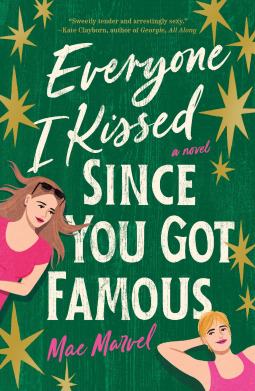
3.75/5. Releases 6/11/24.
Vibes: second chance (or first chance after you never took the second), figuring out what love actually is, the cult of celebrity
Heat Index: 6.5/10
Wil Greene and Katie Price grew up together--their moms were best friends, after all. Then, in their senior year of high school, they became best friends... and almost more. But Katie went off and become a super successful, internationally famous actress; and more recently, Wil has become known for a viral TikTok account where she kisses new people every week and posts the videos. Katie's seen plenty of them. And now that she's back in Wisconsin for a month, she may be ready to finish what she and Wil almost started all those years ago.
This is an overall lovely (though imperfect) heartfelt, funny, and sexy romance that sort of mashes second chance with friends to lovers, though like--were they ever friends? Or were they finally allowing themselves to be close to each other despite the burgeoning tension? It's hard to say.
Don't worry about the celebrity angle--it's not that sexuality doesn't matter here, but you don't have a lot of "but what will the public think?" angst. Not that that's inherently wrong for queer celebrity romances. But this book is focused on something else, and though I think it sometimes got wrapped up in the characters' heads, it still leaves me wanting to read more from the Mae Marvel team (yes, that's a pen name for two writers!).
Quick Takes:
--Okay, so I want to get something out of the way here, as the back copy mentions 'Tis the Damn Season: how Taylor Swiftian is this? I would say, overall... enough to where, even if you notice a thing here or there, you can overall ignore it. The biggest thing for me was Katie's cats, which she's quite well known for having. And really? That probably wouldn't have come off as Swiftian to me if not for the TtDS comp. So... while I get it, I do wonder if that comp will turn some people off. I hope it doesn't.
--There's actually a really interesting connection between Wil's TikTok videos and Katie. Like, I was initially hesitant about the TikTok aspect, but the way it loops back to this connection between the two of them (beyond Katie being turned on by them... which she is) is clever. I appreciate that degree of thought going into it, the subtle character work.
--What's not subtle is the way that Wil and Katie talk to each other! I was of two minds on this. On the one hand, I kind of like that right out the gate these two are upfront about being into each other. It dodges a lot of the issues I find with friends to lovers stories, because again... are they friends? When they admit that they at minimum want to fuck from the beginning?
On the other, I did feel like these two communicated a little too well. I've seen a lot of reviews celebrating this, and I get it! But there's good communication that feels real, and good communication that's a little too good to be true. This was the latter, though it isn't too big of an issue. It's just that--at some point, I was like "okay we know where we stand, let's get this tied up". It's not because I wanted the story to end... But a huge part of any potential central conflict never happened, because Wil and Katie were on the same wavelength from the jump. Again, for a lot of people that's going to be great. For me, it did slow the book down a bit.
--In the same sense, these two just like each other so much. They're so besotted. And you get that over and over in the narrative. How amazing Wil thinks Katie is, how remarkable Katie thinks Wil is. And I would say that most of the time, that's really cute and genuine and sweet and soft. But it did go a little overboard.
--There's a really compelling backstory on both sides, and both are so real (in often sad ways). And in general, this was something I liked about these characters. Even when the sequence of events isn't that realistic--Katie has done a LOT in her young years, even by super famous actress standards--the leads still feel real. It adds to their love story and the intimacy between them.
The Sex:
The sex in this novel isn't that explicit, though I appreciate the diversity of sex acts and the way in which it was all seen as sex. You get about four-ish scenes. But beyond that, there is SO much sexual tension in this book, and it's hot. I mean, a lot of this novel is about kissing, and the moments before kissing, and knowing you want to kiss someone... It's delicious.
Was this a flawless book? No. I think there are still some things that need to be smoothed out, more of an emphasis put on the things that really leans into the raw and honest moments Marvel writes. But it's a fun read, and if you want to read about two ultimately good women falling in love--this is it.
Thanks to NetGalley and St. Martin's Press for providing me with a copy of this book. All thoughts and opinions are my own.
2 notes
·
View notes
Text
Marriage is one of those life experiences that defies complete comprehension until you’re in the thick of it. For years, I’ve told my daughter Mary—now a newlywed—that no amount of advice, observation, or preparation can fully explain what it’s like. The reality of marriage, I’ve said, is something that hits home almost every day. And when it does, it’s both more challenging and more profound than you ever imagined.
The best definition of marriage I’ve encountered is "a state of antagonistic cooperation." It’s succinct, truthful, and captures the paradox at the heart of so many partnerships. Marriage is, at its core, a partnership—but not always a peaceful one. Two distinct individuals, with their own habits, quirks, and values, must find a way to share a life. The "antagonism" acknowledges the inevitable conflicts and differences, while the "cooperation" underscores the mutual effort required to build something lasting. Together, they form a dynamic that’s equal parts frustrating and rewarding. Everybody trying to pound the bestness version of each other into the lacking versions that continually exist, frustrate and flabbergast as mystery becomes overwhelmed by history and platonic ideals give ground.
Oscar Wilde, with his characteristic wit, once described marriage as "the triumph of imagination over intelligence." It’s a humorous take, suggesting that entering into such a complex relationship often involves an element of fantasy or optimism that defies pure logic. Yet, there’s a kernel of truth in Wilde’s words, as the imagination required to build a life together often sustains couples through the inevitable challenges of marriage.
Kurt Vonnegut once added his wry perspective to the subject, offering a formula for mate-seeking: "Find a woman who hates you and buy her a house." It’s classic Vonnegut—absurd, biting, and strangely insightful. His formula pokes fun at the transactional or adversarial undertones that can creep into relationships, while hinting at a deeper truth: successful marriages often endure not because they’re perfect but because they navigate imperfection. The tension between love and opposition becomes its own kind of balance.
But for those who enter marriage willingly, the daily reality can feel like a series of revelations or landmines.You learn that compromise isn’t a one-time deal but a continuous process. You discover that love isn’t just a feeling but a choice you make, sometimes in the face of frustration or fatigue. You realize that the little things—shared laughs, unspoken understandings, and small acts of kindness—can matter as much as the grand gestures. And you gotta watch your step....remember the land mines. Learn where they are and if ya can't defuse them...step around 'em.
In conversations with other married couples, one thing stands out: people often focus more on tales of frustration and conflict than on stories of collaboration and joy. Wives frequently joke about their husbands’ perceived immaturity and while these remarks might come across as harmless, they reflect a broader cultural tendency to scrutinize masculinity in marriage. These criticisms, intentional or not, can act as subtle forms of gendered bias. However, there are moments in these conversations when a wife speaks with genuine pride about her husband. Those instances restore my faith in marriage and serve as reminders that respect and admiration often lie beneath the surface, even when they aren’t always voiced.
A third party in the union is the marriage itself. Once anybody starts blaming the marriage, the marriage suffers and may not have the strength of recovery that individual human persistence possesses. When we say "it's not you or me, it's the marriage" what we are really saying is "It Is you and me and we're blaming the innocent victim." Sometimes the marriage never recovers from the assault and fails to survive.
There’s also a profound truth to the idea that the only people we truly get to know are our husbands and wives. Marriage stands apart because it’s not only deeply personal but also legally binding. That legal commitment creates a unique framework where two people are tethered in a way that demands both accountability and vulnerability. It’s not just about living together or loving one another—it’s about sharing a life under a mutual agreement, with all the responsibilities and permanence that entails. This bond forces a kind of honesty and intimacy that might not exist otherwise. You can’t simply walk away from disagreements or differences; the commitment encourages you to work through them. This constant proximity and shared obligation bring out parts of each person that no one else may ever see.
To Mary, Jon and others beginning this journey, I’d say this: Marriage will surprise you. It will challenge your patience and deepen your empathy. It will test your ability to communicate, to forgive, and to grow. Pain and disappointment? They’re part of the package, just like joy and pride. But through it all, it will teach you more about yourself and your partner than you ever thought possible. It’s rarely easy, but cling to each other with bonds of steel and be proud of what you build together.
0 notes
Note
Thanks for answering my question about Bridgerton. Really loved hearing your thoughts. I personally love lady featherten and I agree with you. I often am drawn to characters more specifically women who are really just survivors. The audience may think of them as villains, but that’s not the case . Totally different vibes but I’m actually in the middle of good girls season three so late to the game Ik, but low-key she reminds me a lot of Beth in many ways. I also agree with your take on Cressida .Wow that girl was going through it and it really sometimes felt like I was watching two different shows . I feel like the writers dropped the ball with her story and yes, Penelope giving her the money would’ve been really great to see . thanks again and hope you have a great day.✨♥️
(x)
You're very welcome, anon! Thanks for the ask.
It's actually one of the things I love about Penelope too is that she has a (not to quote IWTV, haha, but) sliver of coldness in her, which is generally on show with Lady Whistledown. She's so warm and compassionate broadly speaking, but it's that little shard of grit where she can write what she writes and expose people without all that much regard for the consequences - particularly when it's her own security at stake as it was with the modistes in s2 - that makes her compelling to me as a character. Like that's interesting to me, and I think it's one of the issues I had with s1 is that Daphne is, at least for most of the season, so without interiority and complexity.
I know that that's something people like about the books, but one of the problems with adapting such a frothy romance into a TV-series is that these sorts of romances are often low-stakes, low-conflict, which works for quick, breezy reads, but doesn't when you're trying to sell an 8-season show (+ spinoffs) to a mainstream audience. The writers are obviously searching for conflict points, and while I know a lot of people didn't really like the Featherington subplot in s2, I think it worked as a means of contextualising both Penelope as a person and her position in society ahead of her s3 arc.
Penelope's a lot more like her mother than she'd care to admit, and it's that ruthless ability to see a situation for what it is and figure out how to make it work for her that makes them both interesting as characters.
But ah! I'm delighted you're watching Good Girls!! I love that show an embarrassing amount, haha. It's imperfect, but I think was underrated in its time and will be one that people go back to because of the ways it explored class, crime and different aspects of womanhood while still being genuinely very funny. I can definitely see the similarities between Beth and Portia too (I actually had the thought as I was replying to you that Beth could've been Portia in a different era and place, haha).
Hope you're having a great day too <3
#i'm definitely drawn to women who are survivors too#i like 'em scrappy and a little hard and willing to do whatever it takes to reach a goal#but honestly - and i've been thinking about this a lot lately because i've watched some bad shows - i think the big thing for me#is care and understanding#in writing acting and directing#i think the writing for bridgerton is a mixed bag right?#but i think both the writers and polly walker understand portia and that they really care about her#and that comes through in the show#with cressida mmm i do think jessica madsen cares about her#but i don't believe that the writers did really#and i certainly don't think they understood her despite the backstory they wrote for her in s3#they threw some plot at her#that doesn't mean they actually know her as a character#and i think that always come through when you watch something tbh#bridgerton#welcome to my ama#bridgerton asks
1 note
·
View note
Text
Thanks so much for tagging me!
1.) Rayla/Callum (Rayllum) from The Dragon Prince



My og, my everything—they have it all. They're so mentally ill. They make each other's mentally ill. They make each other better. Their first "I love you" is the climax of arc 1. They got over centuries of hate and bloodshed just to be together. Truly the most enemies to friends to lovers of all time. Callum asks Rayla to kill him if worst comes to worst. They broke each others hearts. They healed each others souls. They'd do unspeakable acts for one another. They are foils. They are themes personified. They've ruined my standards for romantic shipping for the rest of my life. Oh my god. I can not overstate how much I love them.
Bonus hug because while they make each other mentally ill, they also make me mentally ill:

2.) Tang/Pigsy (Freenoodles) from Lego Monkie Kid
So. Legos. I know I know—but there's just something about these two. One's a freeloader food lover who inherited the powers of the great Monk Tang Sanzang. The other is a small business owner/single father who is a decedent of Zhu Bajie. They're basically canon. Mr. "One day I will become someone they can depend on, the way I can always depend on them!" being someone the Pig can depend on (cough cough 2x04 and 4x03 cough cough) is just fucking it. Pigsy saying "Yeah! Sometimes it’s that little bit of char that makes for a more flavorful meat! Even if it is a bit tangy" in 3x14 after Tang insists that an imperfect world is worth fighting for? Bro. Loving each other in imperfection. Like. Bro. Imperfect people are worth fighting for. Like. Bro.


3.) Sora/Riku (Soriku) from Kingdom Hearts
Soriku. Oh my god. All these two can do is chase after one another. If they manage to reach each other, then they're separated again—and yet, they always find their way back. This endless conflict between finding and losing makes these two like, PEAK. Riku literally performing a sacrifice of love at the end of KH3? Traveling to the afterlife in search of Sora? Very few are doing it like them. Also basically canon. Sora is the darkness in the light and Riku is the light in the darkness. They complete each other, their hearts are connected, and I can't help but love 'em.


4.) Suzie/Noelle (Suselle) from Deltarune
Deltarune fucks me up. Suzie and Noelle also fuck me up. Suzie is the only character to ever force her choices upon you, the player, and Noelle is the only other character besides Kris who you can so directly control. They are the classic Jock and Nerd or Beauty and Beast pairing, except they flip those tropes on their HEAD—each character has a little bit of both despite first appearances. They're lesbians. They're dorks. They're doomed by the players choices, mere puppets in a game they don't yet comprehend. And they're fucking ADORABLE. Susie is the one thing holding this trainwreck together (in my opinion), especially in snowgrave, and I LOVE IT.





5.) Rapunzel/Eugene (New Dream) from Tangled
New Dream, a ship that's always been there for me. I've only watched the first 2 seasons of the show so I'm mainly talking about the movie, but Rapunzel and Eugene will always be near and dear to my heart. "You were my new dream" "And you were mine" LIKE COME ON. One sassy jaded rogue and a kind-heated naive/lost princess walk into a bar, then forever changing each others lives. Eugene died for Rapunzel. Rapunzel was willing to die for Eugene. They showed each other that there's more to life than the tower rooms you've been put in. There's more to the dreams you carry with you. God, the way Eugene always brushes Rapunzel's hair out of her face (v.s. Gothel who is only ever affectionate with her hair). I'll always love 'em.


Honorary mention: Crowley/Aziraphale (Ineffable Husbands) from Good Omens.
Other honorary mention that I couldn't include because it's also from tdp: Janai/Amaya (Janaya). Also so so so thematically good and so delightful.
I don't know if I want to tag anyone, but if you're my mutual/someone who wants to participate go ahead!
Slash ships to get to know me
Rules: name at leave 5 ships that you love, each from a different fandom.
Thank you to @davidbowielovesyou for tagging me! <3
Runaan/Ethari (Ruthari) - The Dragon Prince
OF COURSE. OF COURSE. my #1 ship ever!! I love them SO much. I've written so much of them purely because of how neat I think they are. They own a part of my heart.
Hange/Moblit (Mobuhan) - Attack on Titan
Heh heh. Genius ADHD scientist and their malewife who literally died for them. Not only are they adorable together but they're hysterical, and they quickly captured my heart!
Linus/Arthur - The House in the Cerulean Sea
Absolute sweethearts who make my heart hurt but also heal it at the same time! Love them so much <3
Bitty/Jack (Zimbits) - Omg! Check Please
Eeeeee hehehe I love them, and have for a long time! Such sweeties (do you see a trend in my ships?)
Phoenix/Miles (Wrightworth) - Ace Attorney
Not much to say here, but I do really like them! The fan art and fan fiction of them is amazing, kudos to that fandom for their awesome talent
tagging @kaia001 @medu-nefer @thethiefandtheairbender
#I'd tag purplelea goldensunset venjamin-kingdomhearts and some of my irls if I weren't a coward#thanks for tagging me dragons this was fun#sorry that mine was kinda long lol#tdp#the dragon prince#rayllum#lmk#lego monkie kid#freenoodles#monkie kid#kh#kingdom hearts#soriku#deltarune#suselle#tangled#new dream#imp tag
31 notes
·
View notes
Text
Death to All Might, Rebirth to Yagi Toshinori
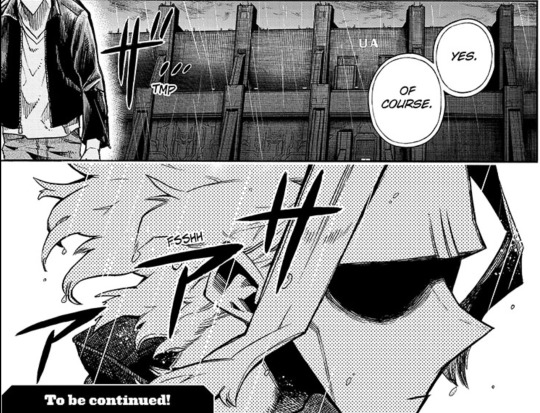
So about All Might. I’ve been extremely wary of talking about what could happen to him because straight up saying “I don’t think he’s gonna die” is asking the universe to spite me. Plus it also feels like a room full of people turning to stare at me as if I said the Sun isn’t a star. Man has death flags everywhere, I know.
But, okay, *Bill Nye voice* consider the following:
Mr. Yagi here, if he overheard everything, just received the final nail in the coffin on his career. His time as the symbol of peace is not only over, it was in fact partially responsible for the current state of things, since he once did so much on his own that his absence now makes heroes and civilians alike ill-prepared to cope. I think it was very apt for that one guy to be wearing an All Might shirt--he was acting as a mouthpiece for the latent societal problems embedded in All Might’s legacy.
We know already that he’s been feeling useless. I love this scene and although I’m not gonna talk about it right this second, remember what Aizawa says about just “being here” being enough:
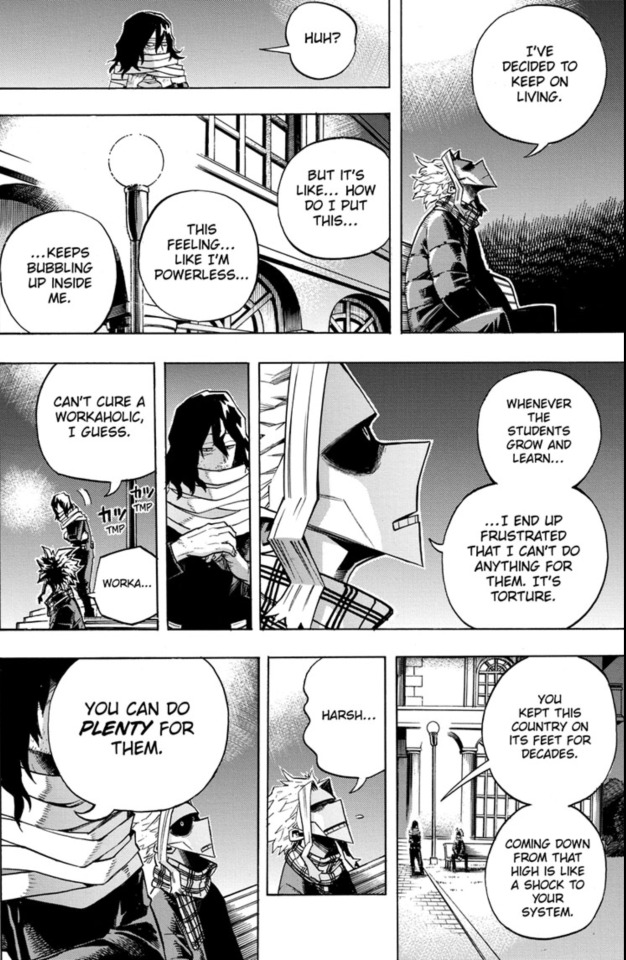
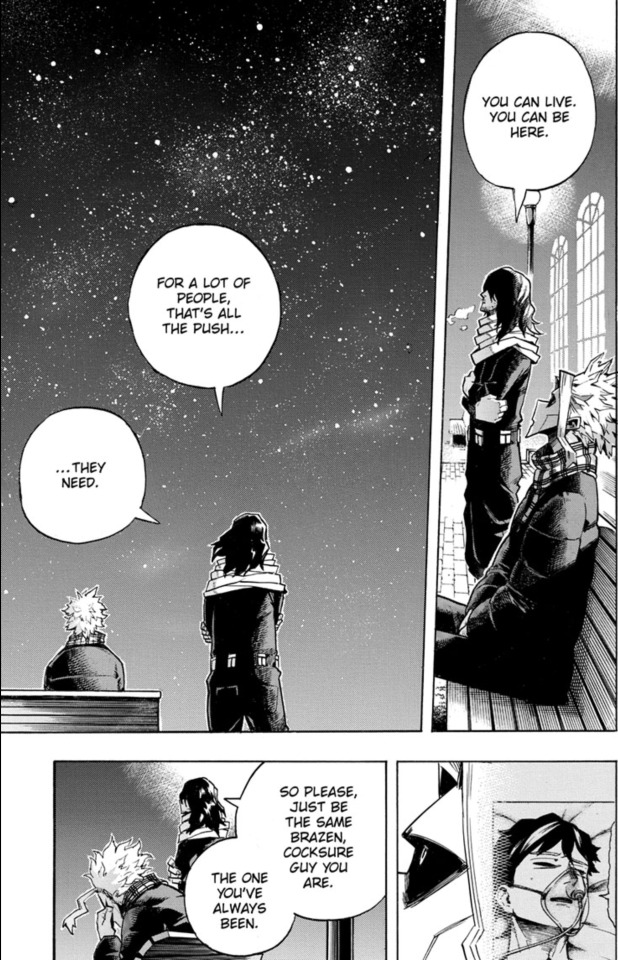
And we know from conversations with Inko that Toshinori is also reframed his purpose around looking after Izuku. But in the end, Izuku rejected his help, and it was his classmates instead who were able to save him. Now the very progress of humanity is rejecting him too. You may me wondering how on Earth I don’t see the logical conclusion of all this being his death. Hold on. It actually has a lot to do with the fact that we’re all expecting it. Nighteye himself saw it, and despite any contrary convictions anyone might have, the plot doesn’t seem to be veering away from that end. All Might Is Gonna Die, says absolutely everything.
It’s occurring to me that I have previous experience with this kind of plotline that probably little to no one else in this fandom shares, being that I’ve read a certain book series in which the main character is told in no uncertain terms that he will die (no, I’m not talking about hp). The series in question is T*e Und*rland Chronicl*s (censoring so it doesn’t get put in their side of tumblr) and I’m sorry but I’m about to go on a shameless tangent about it and spoil the ending for you.
So in this series there is a prophecy in every book, each one having something to do with war and conflict, and so far all of them have been right. In the last book [mc] finds out that it’s prophesied that he will be killed. Lots of the things in the prophecies are convoluted and metaphorical, but no, this one literally says “when the [mc’s title] has been killed.” He spends the whole book coming to terms with this, and he gives into it, only to find himself waking up in the hospital instead. “Wow, plot twist. /s” you may be thinking, and yeah sure, the mc in a kids book survived, big shocker. But it doesn't end there. After the war, there are peace talks, but they escalate until the two sides are on the verge of declaring war again. And [mc], bless him, has just been caught in the middle of all of this the entire time. He’s sick as shit of fighting, of watching the suffering and death of people he cares about. He draws his sword against both of them angrily, gives a speech saying he won’t take a side, and then promptly breaks his sword across his knee: “There. [mc’s title in the prophecies] is dead. I killed him.” He’s giving a huge middle finger to everyone there, to the man who wrote the prophecies, to the entire fucked up culture of it all. And so something that was taken literally turns out to be metaphorical. That is, if you still believe in the prophecies at all.
Hopefully you’re catching my drift here. What I’m saying is, even though this other series has nothing to do with bnha, it goes to show sometimes it’s the most absolute certainties that are red herrings, and a “death” can consequently be a symbolic one. In All Might’s case, it could be the death of hero society and a rejection of his own past. In other words, character development for Toshinori himself that reflects on the way the world is changing, too. Also there’s the fact that the mc from that other series I’m trying not to name has an honorary title, and I’m imagining that role he occupied “dying” could correspond to something that amounts to, “All Might is dead. I (Yagi Toshinori) killed him.”
And here’s another thing: we also have to ask ourselves what good a dead Toshinori is to Izuku, narratively speaking. Yes, Izuku has spent his whole life idolizing even the more toxic parts of All Might, and his idealized vision of his hero does need to “die.” But how about Toshinori as a father figure? Izuku regretting that his last interaction with Toshinori was to reject his help may drive home the fact that he shouldn’t go off on his own, but at this point it’s kinda redundant. If anything it would negate some of the progress that was just made because it’d make him extra paranoid about losing other people too. To be honest, the whole “Uncle Ben” trope, the mentor/father figure who dies and gives the mc a reason to do better, is so tired. Experiencing the death of a loved one really doesn’t deserve to be romanticized like that. I might as well admit that I’m speaking from experience, and let me tell you, losing someone you love suddenly, when you weren’t around, and with unfinished business--it makes you paranoid as hell that it will happen again. It literally gives me nightmares. Y’all, I cannot stress enough that trauma does not equal character development. Granted, just because I know this doesn’t mean Horikoshi does, but in general he does seem to lead his characters toward healing.
Okay, back to the present. Toshinori is turning away from UA. He likely feels useless and rejected. We can infer that what happens next will involve Stain, and we have a couple of extra clues to go with it: Stain considers All Might a true hero, and has stated that he would let All Might kill him. And since Horikoshi loves his parallels, we also have this fight between Endeavor and this random villain who admires him so much that he wants to die by Endeavor’s hand:
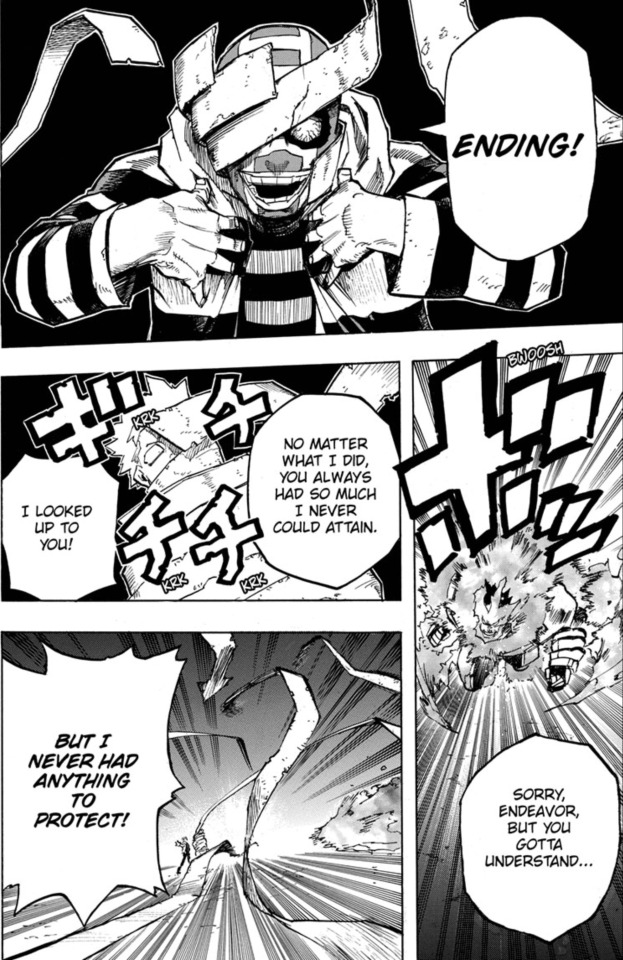
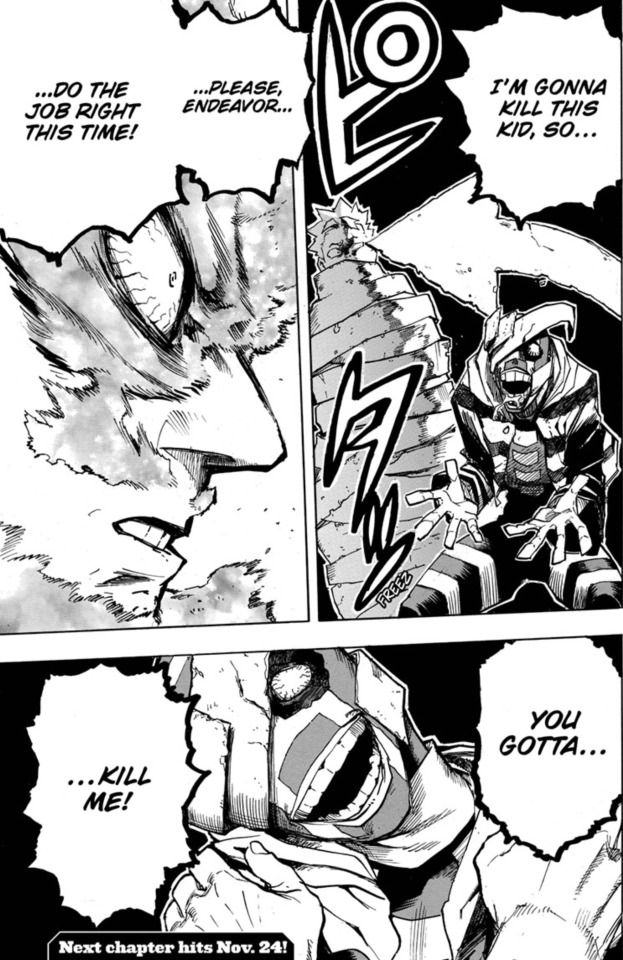
This suggests a confrontation in which Stain challenges All Might to live up to himself as he once was, so that as a hero he can vanquish Stain and symbolically overcome society's perversion of that role. But based on what All Might has learned about the system he upheld, Stain is wrong. All Might is not a “true hero” in the sense that the societal issues Stain witnessed exist not in spite of All Might, but (in part) because of him, because he took too much of the responsibility for himself.
Stain probably had no idea about the personal cost of All Might’s lonely burden until after the fact. Maybe he’s seeing it now. So then perhaps the confrontation would be more about Stain claiming he’s just as fake as the rest. Either way, Toshinori has the opportunity to denounce himself and be rid of “All Might,” to stop living in his own shadow. Nighteye’s vision has been defied before, and I honestly wouldn’t be surprised if the combination of society shifting + Toshinori’s own conviction is enough to do it again and work fate in his favor.
He is not All Might. He is Yagi Toshinori: quirkless, worn down, and directionless except for his dedication to Izuku. If he survives his interaction with Stain, he can resolve his imperfect mentorship by confessing about his shortcomings and simply supporting Izuku as a part of his family, not as his teacher (as Aizawa said, just “being there”). And that’s how you really get character development, for both of them. I mean, shit, imagine Toshinori straight up telling Izuku to stop calling him All Might.
#disclaimer: I have a lot of emotional investment in dadmight#so I am hella biased#but hopefully I also have some unique insight to share#all might#yagi toshinori#bnha#mha#bnha meta#bnha 325#bnha 326#lin speaks
578 notes
·
View notes
Note
Hey could you do the Evans’ characters reacting to reader’s stretch marks?🥺 thank you luv you
The Evans and reacting to the Reader’s stretch marks
Warnings: I am NOT going to write stretch marks as something negative or something to be ashamed of/insecure about! They are just a natural part of bodies- so they are just a part of the body in my writing. The only negative parts are from people like Kai, tate, and Jeff.

Tate:
As much as ya’ll want to think you’re the exception, Tate is probably just like kai, just a little more stupid. He probably thinks they’re something worse at first, pulling you aside and making sure you’re ok. When you tell him that they’re stretch marks and not scars, he will probably scrunch up his nose and roll his eyes, mostly because he’s a teenage boy and he’s uninformed about what they really are. After he is, he really doesn’t pay them any mind.
Kit:
Oh boy, I think it depends where they are honestly. If they're on like your thighs or ass he probably doesn’t really notice them, But if it’s your stomach- especially if they were from pregnancy- he will adore them, probably rubbing lotion on them and kissing them. He definitely likes to think about how they came from your kid, definitely thankful for every day.
Kyle:
Pre death I think Kyle probably doesn’t notice them. He thinks you’re hot exactly as you are as every teenage boy is. Post death Kyle is a bit different. He loves to lay on your lap, stomach or chest and trace the lines in awe. He loves to just stare at them and sometimes he will take a marker and draw on them if he’s feeling particularly inspired. He will sometimes equate them to the tiger in his kids books (early on in recovering).
Jimmy:
Ok let's be real, we all Jimmy loves a good thicc partner. That thiccness is not unaccompanied by natural stretch marks obviously. I think he loves them honestly. He definitely gets a little hard when you wear outfits that show them off, that includes when you perform, which makes his performances a bit more challenging. He most definitely peppers kisses all along them every night whether in a sexual way or not.
James:
I think he’s conflicted between thinking his partner should be perfect and the thought that you're already perfect. He definitely worships the ground you walk on so anything others may deem as undesirable he will love endlessly. James definitely loves all marks and scars on your body. He most likely doesn't say anything about them though, just silently admires them.
Kai:
Honestly we all know what i’m about to say, Kai is a dick about them. But let's just pretend that he makes an exception for you when you two are dating (Pretend he’s not a dick for a minute with me). I think even if you were his exception, he would choose to ignore rather than love them like the other guys. He might not even look at them or notice them all that much. In actuality Kai probably will call you fat or even get you those “magic stretch mark removal” cream because he’s an ass.
Malcolm:
He probably Isn’t one to immediately notice them. I mean he has plenty of resources that “fix” this type of thing but he doesn’t see any reason to even try because they’re just part of natural life. Sometimes he will just remind you how amazing your ass looks, accompanied with a gentle smack and the two of you will usually laugh it off and move on.
Jeff:
He is honestly probably just like Kai and Tate, but a bit more of a himbo. He doesn’t really know that they’re natural, but he definitely wouldn’t ever put them on one of his sex dolls. If he doesn't see them in pornos they probably don’t really exist. Along with the ignorance, he probably also buys you those “Magic” creams. After you explain it to him, he probably just shrugs and moves on in whatever he was doing.
Austin:
He’s probably the kind of artist that refers to them as something artful like “Angel scratches”. Austin probably will write about them and all your “imperfections” in his music because you are his inspiration for a lot of the love songs he writes. If he feeds from you, he will probably add some of his own marks along with the stretch marks.
#tate langdon#kit walker#kyle spencer#jimmy darling#James Patrick march#malcolm gallant#Jeff Pfister#austin sommers#the evans#asks
127 notes
·
View notes
Text
Something I love about Obey Me is that, on the whole, for every trait a character has, they have another trait that actively counters it and thus makes them seem genuinely conflicting on a surface level, but wonderfully three dimensional on a deeper dive into their character.
E.g. People in the early-game sometimes think Diavolo comes across as a little two-faced, or that there’s something a little suspicious about him and the things he does - and I def. originally saw some theories (and when I first started playing, had some suspicions of my own) that he might end up being the real “villain” of the game.
A lot of this stems from the fact that he seems genuinely friendly, open, and willing to spend time with the exchange students in casual, informal ways, but also has abilities and moments of power abuse that seem to completely diverge from the image of the smiling prince.
Surely someone who does this is hiding something? Surely that carefree attitude is just a facade? It’s definitely the sort of twist you could expect with the character setup present in Diavolo.
But when you look at it, there’s a reason behind this duality that doesn’t actually fall into the usual tropes - and instead builds a much more interesting, well-rounded character.
(Spoilers ahead, both for Lesson 16 and for the most recent Lessons, especially involving Diavolo’s childhood.)
For instance, how could he claim to see Lucifer as a friend when he has him bound by an Oath that puts an incredible power imbalance in their relationship, and stops him from speaking of it?
The answer is that he’s genuinely never had a friend in his entire long life that hasn’t had some form of reason to stay by his side. To Diavolo, the Oath was a way of ensuring Lucifer couldn’t leave - not a way of keeping control. He wanted Lucifer to be his friend, has been enamoured with him even since Lucifer was an angel, and took the opportunity to secure that friendship in the only way he knew how.
Because Diavolo is pitifully lonely. Because Diavolo was raised in a way that left him incapable of making friends. Because Diavolo likely never would have been able to make a friend if he hadn’t tethered them to him.
Does this make the Oath any better? No. He took advantage of a broken, freshly fallen angel, terrified of the fates of his siblings, and vowed him to silence and servitude in return for their lives.
But does this mean that the Oath was inherently evil? No. At its core, the Oath was the act of a very lonely man realising he had a chance to secure the one thing he wanted more than anything. It was selfish, but not evil.
It does, however, show us the sort of extent Diavolo will go to get what he wants. He will leverage something over others if he thinks that’s what it takes. This is even reinforced by the truth of Barbatos’ servitude; that he treatened to refuse ascension to the throne if Barbatos didn’t stay.
At the same time, it shows that what he wants, more often than not, is something harmless, if desperate. It’s often a desire for companionship that spurs him into dubious action.
He’s very unlikely to abuse his power to genuinely hurt someone, but he may use his power in a way that has hurtful side effects.
Diavolo is aware that his actions had consequences, and feels guilt. He still isn’t confident that Lucifer and Barbatos genuinely want to stay with him or in his service, and he’s openly aware of the fact that Lucifer, at the very least, doesn’t see them being as close as he does.
He doesn’t want to remove either of them from his service for fear that they really will leave him, but he’s aware that keeping them there potentially against their will isn’t conducive to healthy friendships.
Diavolo has done dubious things for selfish reasons. This is undeniable. But those reasons are genuine and understandable, and something players can easily sympathise with.
That’s the sort of thing you want for a well fleshed-out character; the ability to say “there was something inherently wrong in this action taken,” but also say “I can understand why he took the action, even if it was wrong”.
I focused on Diavolo for this, but here’s another two points I can think of to further illustrate the point:
- Lucifer’s genuine love and care for his family constrasting against his prideful brutality and absolute loyalty to Diavolo above all else (e.g. how he can justify locking Belphie up in the attic. This was an act of love. The alternative was to hand Belphie over to Diavolo and let him face an unknown fate. By locking him up for the duration of the Exchange Programme, Lucifer was working to avoid being disloyal to Diavolo and being disloyal to his family. It was absolutely an imperfect solution. It absolutely had its flaws. It absolutely made things worse. But it was his way of keeping his youngest brother alive and allowing Diavolo’s dream to come to fruition. A dubious act founded in good intentions.)
- Satan’s kind thoughtfulness and amicable nature contrasting against his Wrath and how it affects his brothers (e.g., how he can switch between fretting over Beel’s mental health in one chat, to being so furious with him over his Gluttony that Beel actively goes into hiding in another. Satan is a character rife with stark dualities and his own frantic attempts to try and stitch together something whole. He’s not overly good at it. His Wrath often gets in the way. But he has spent his entire life trying to improve, to find himself, to come to terms with his creation; he is trying every day not to be the Satan that lashes out at the drop of a hat.)
The game isn’t always perfect at showing these characteristics in equal measure, but sometimes that’s the point.
It’s why, for instance, some people write Satan to be a heartless, Wrath-filled asshole, and others write him as a harmless bookworm with a knack for academia; the truth is that he’s both, and a key part of his characterisation is finding balance between the contrasting sides.
On the other hand, it’s why some people completely look over Beel as very two dimensional when he truthfully isn’t. He’s a naturally quiet demon, content for others to see him as a jock with a love of food and nothing more. But in that quiet, he hides a demon struggling with survivor’s guilt who is secretly hurt by how simple people think he really is, and has such a strong love for his family that he puts them before anything else. His characterisation isn’t finding a balance in his contrast, but finding the contrast to begin with.
That’s the point of a three dimensional character. You’re meant to be able to debate about them, and understand them while disagreeing with them. You’re meant to be able to view them from different angles and see something new each time. That’s half the fun of them - that’s what makes them interesting.
I won’t lie and say the game’s great at this all the time, because sometimes it is really, genuinely not, and sometimes even Solmare have a tendency to forget some of the deeper aspects of their characters for the surface-level stuff.
But for what is there? There’s so much interesting craft at work in the characters, and it makes taking a closer look at each of them - and how different players view them - so, so enjoyable.
#obey me#obey me diavolo#obey me satan#obey me lucifer#obey me beelzebub#I'm really not too sure what else to tag this as?#It's really just a little bit of character analysis asdfg
167 notes
·
View notes
Text
Yes, it's nearly 2.00am (because that's apparently the only time I have inspiration to write essays) but I've been thinking a lot about this lately and wanted to get it off my chest, so here you go:
The main goal of Merlin becomes disturbingly fractured along the way, which opens up the gaps for the prophecy to seep through instead of following the expected channels, but it can essentially be boiled down to three key elements 1) build albion; 2) decriminalise magic and 3) save Arthur, but when all is said and done, we never really see any of those objectives achieved.
Now, there are a few reasons for this, both from a writing perspective and a plot perspective. The first, and one of the most obvious, is that this show loves irony. I won't go into a lot of detail here because I've already written a whole ass essay in this very subject, but in a nutshell, you can look at this from two perspectives: firstly, it's important to establish that this technique is purely about the angst: it's the writers' way of provoking a reaction from an anguished audience, but it's foreshadowed just enough to make it more painful than it is shocking. Alternatively, there is the more plot motivated irony in that it genuinely makes a good story. Irony is a technique that has been used for thousands of years, not just because it provokes a reaction from the audience, but because it allows you to explore your characters in greater detail than before, riddling them with hidden juxtapositions and internal conflicts that are never resolved quite in the way you expect. The irony in Merlin is the epitome of this, with the whole motif of Arthur needing to die for his reign to begin. It is a classic example of the simultaneous despair and hope that mocks you from the shadows.
Following this, there is another force at play that deals with half truths and seemingly imperfect contradictions, and that's prophecy. It's not really a secret that I have very strong feelings about prophecy and its effects on all the characters, Merlin in particular, and the fact that fate and destiny are such key themes in Merlin both makes perfect sense and wants me to smash my head into a brick wall. Prophecies are another common trope that often go hand in hand with irony (think Oedipus Rex, Macbeth, The Iliad, all that doomed hero shit that I inexplicably adore), the key to their influence over the plot often lying in how they usually come true in the most unexpected of ways. This links back to that initial theme of irony, but this isn't what makes me angry: what is infuriating is that prophecies tend to come true, no matter what, and most of the characters seem not only to know this, but to let it take their autonomy over their respective fates, driving them to disaster.
Let me elaborate: especially in season five (I'm assuming just for the added fall at the end), Merlin talks a lot about how "one day, things will be different". He tells sorcerers that one day they won't have to hide. That one day, they won't have to live in fear of who they are and what others think of them. And Merlin is right: while it is not explicitly stated, it's generally established that this is one of the things Merlin should actively be working towards. But here's the kick: except for a few specific circumstances, when has Merlin ever actively tried to change Arthur's mind about magic? Yes, he has taken a few opportunities, like with Dragoon saving Uther's life, or with the Dolma's final request, where he has encouraged Arthur to rethink his choices, but otherwise, his support has been lukewarm at best. Instead, his primary concern was always saving Arthur, so he can become the king the magical world hoped he'd be, but he left out a crucial part, trusting in the prophecy to fill in the gaps. He knew it would come true, but it was, almost predictably, in the one way he never dared to expect.
And in a twisted way, there's that thread of irony again: Merlin thought he was saving Arthur so he could one day become the king who would see magic as a force for good, but instead, he created someone who was merely a survivor. It was Kilgharrah who said it first, and he who would mention it last: they are two sides of the same coin. But as willing as Merlin was to give his life for Arthur, and vice versa, he was never really ready to give him his mind.
Another interesting thing to note is Merlin's fixation on the "Saving Arthur" lens of the prophecy over the "Restoring Magic" part. Now, there are a ton of ways you can look at this, depending on how far along the scale of Queer Analysis you are, so I'm going to try and address a couple. At one end of the scale, you have the fairly simple and very believable "merthur" take. This basically boils down to the fact that Merlin and Arthur may or may not be deeply in love with one another, and that drowns out any voice of reason that may unfold. This is actually fairly canon compliant, particularly looking at incidents such as the Disir, when Merlin chooses Arthur over his and his people's freedom, though that choice was clearly, in hindsight, misadvised.
At the other end of the spectrum, there is the idea that it is the work of Kilgharrah, Gaius and other responsible figures in Merlin's life when he was new to his role in destiny, who reiterated at every occasion that Arthur must be protected at all costs. This may have ingrained into Merlin's thoughts and influenced his decisions from here on out.
Between those two points, there is a grey area, and I am of the personal opinion that neither extreme entirely satisfies the situation. For me, I think the characters in question are far too complex to have such simple motivations, and that the true reason lies somewhere between the two: Merlin undoubtedly cares for Arthur, and while at the start, his actions in protacting Arthur may have been driven by other (largely superficial) motives, over time, their mutual affection blossomed to the point where certainly the more personal quests were motivated not by need, but by love. However, there is a divide here, and while the line in the sand smudges from time to time, it never really disappears: a lot of instances in which Merlin is trying to help Arthur are entirely overshadowed by destiny, and in time, Merlin comes to accept that Arthur and Destiny are, in fact, one and the same, and this is where that ever-present tragedy lies. For all he truth in here, Merlin doesn't get everything quite right: he sees Arthur as a balance that needs to be protected, without fully realising that he doesn't just have to keep the sides of his equation in equilibrium, but he actually has to start solving them if he wants them to endure.
Having just said all that, sometimes I decide to fuck over complexity for a few hours purely because I am a shameless merthur hoe.
Also, can you take a moment to please note that this last section is highly subjective and it is completely up to you as to what you decide!! This is just my opinion and you're welcome to agree or disagree at any point.
So, aside from the Angst Factor™ and twisted character development, why was the main goal never fulfilled? Unfortunately, that is a question far cleverer people than me can only speculate, as the writers alone know the answers, but I'm going to give my opinion a shot. Honestly, there is something beautifullly poetic about something that never ends, or ends when there could be something more. Humanity has struggled with endings-and beginnings- since it learned truly how to think, because that kind of finality, that inkling that there might have been nothing before and after something else is incomprehensible. In leaving Merlin in a place where the next point was uncertain, the writers left the story open for us. In depriving us of that catharsis, they effectively made sure that the story would never be over, not until we want it to be. And yes, it was painful. I can't think of an ending that was more heartbreaking than that curious mixture of closures and openings all at the same time (hell, I could write a whole essay based on this concept alone!), but it was also a gift, ironically like that of the prophecy itself in that we can choose what we want to do with it, safe in the knowledge that there will be a happy ending again, one day.
In summary, we might not be left with catharsis in the way we wanted. We might not have got the happy ending that could also have stretched on and on indefinitely. But we were left with something else, something equally beautiful as closure, but in the complete opposite way. Amongst the remains of allwe had hoped to build, Merlin left us hope.
#sorry for the inevitable ineloquence here i am absolutely knackered#bbc merlin#merlin#merthur#i'm going to regret this in the morning
58 notes
·
View notes
Note
May I please ask what your preferred dynamic between Holmes & Lupin would be? (From what I can tell, the term 'frenemies' might have been invented for these two - if any two characters in fiction WOULD spend all their time trying to one-up each other it's these two, if only their diverse other commitments, challenges & interests left them the free time to do so: I'm also morally certain a sadly-hypothetical Holmes/Lupin team is one of the few things that could bring down Fantomas for Good).
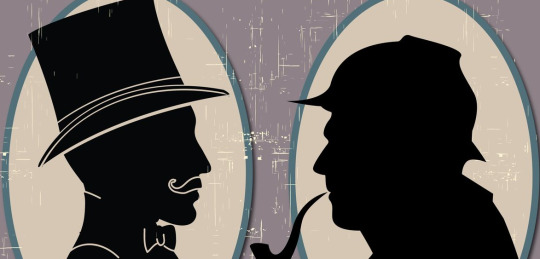
I think "frenemies" is what ultimately works best for these two specifically, because there's a certain untouchability to icons as big as these two that limits the potential stories you can tell with them (although yes, definitely on board with the two having what it takes to bring down Fantomas, although probably not as cleanly and easily as they might expect).
The original Leblanc stories involving this premise are very much centered around one-upmanship, even embracing a theme of national rivalry of England vs France. They acknowledge Holmes's talents but without the awe, with a somewhat aged Holmes with mundane imperfections easily exploited by the daring young thief, someone deserving of his legend but who doesn't quite live up to it. Obviously Lupin's gotta have the upperhand, not just because it's his author writing it, but because the whole point of Lupin's creation was to be the new hotness, the counterpart to both the stuffy old Great Detectives as well as the aristocratic master burglars, and really, what kind of rising superstar would he be if he couldn't put one over the other guy? If he's gonna live up to his claim of being the greatest criminal ever, he's gotta be able to humble the greatest detective at least a little.
The treatment of Watson (Wilson) is tasteless and it's frankly a bit saddening to see that even back then writers were still shitting on Watson far too much, but on the whole I think Leblanc was a lot fairer to Holmes than he could have been (certainly other writers from this time period who added Holmes to their stories were not as fair), he makes it very clear Holmes is not just another Ganimard out of his depth and is very much as close to an equal Lupin's ever had. I think the description used to cap off their final meeting is very much on point:
"You see, monsieur, whatever we may do, we will never be on the same side. You are on one side of the fence; I am on the other. We can exchange greetings, shake hands, converse a moment, but the fence is always there.
You will remain Herlock Sholmes, detective, and I, Arsène Lupin, gentleman-burglar. And Herlock Sholmes will ever obey, more or less spontaneously, with more or less propriety, his instinct as a detective, which is to pursue the burglar and run him down, if possible.
And Arsène Lupin, in obedience to his burglarious instinct, will always be occupied in avoiding the reach of the detective, and making sport of the detective, if he can do it. And, this time, he can do it" - Arsene Lupin vs Herlock Sholmes
The consistent outcome is that Holmes "wins" the material battle while Lupin gets away with the spiritual or karmic victory. The first story, Holmes has Lupin figured out from a glance, robbing him of his greatest asset, and Lupin even tells Holmes under a guise that he has no greater admirer than himself. Holmes choses not to arrest Lupin, and instead solves the mystery as quickly as Lupin would. But he is also, well, inferior. His "commonplace appearence" dissappoints the guests and detectives at the crime scene, he doesn't resemble their expectations, he is gruff, ungracious, arrogant and all-business, an Englishman all the way, and Lupin one-ups him by returning to him his stolen watch, and Holmes is not a good sport about it.
The whole "Herlock Sholmes" name change, although it was out of legal obligation, almost reads like a cheeky courtesy of Leblanc, like he's giving Holmes enough of a courtesy in sparing him the embarassment of being the loser. And the following adventures stay consistent: Sholmes is smart, as smart as Lupin, and he's a gentleman. But he isn't as smart as he thinks he is, and he isn't as much of a gentleman as Lupin. He resorts to unsporting tactics like intimidating Lupin's lover and involving the police in their conflict, and in the end, he's solved the crime, but "sown the seeds of discord" in a family Lupin was protecting, becoming the villain for a change, a role reversion Lupin openly laughs at. Holmes wins the "loot", he wins the material battle, but Lupin has the last laugh, and despite being a self-proclaimed villain, Lupin gets the moral victory.
It's a quite unflattering view of Holmes and one perhaps not suited for a crossover outside of the specific context of Holmes being the old and stuffy intruder in an Arsene Lupin story. Then again, every great hero needs a lesson in humility every now and then.
There's a particularly interesting variant of this dynamic to be found within China's own takes on Sherlock Holmes and Arsene Lupin.
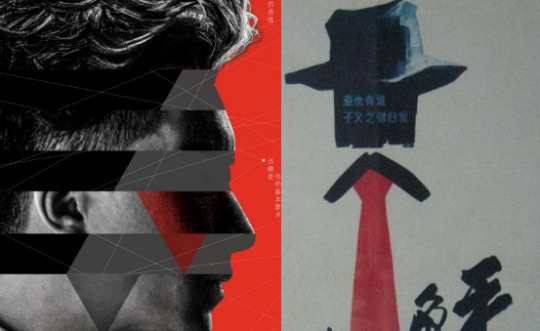
Sherlock Holmes was quite the breakout hit for Chinese audiences at the time of his release, revered as an alternative to Judge Bao and the court-case novels. It's estimated that from 1903 to 1909, detective fiction constituted over almost 50% percent of all Western translated fiction, and with Holmes followed others like Nick Carter and Charlie Chan, and then Arsene Lupin, and soon their own local versions. The most famous and popular of which was Huo Sang, created by Cheng Xiaoqing, who was one of the main translators for Conan Doyle's stories. Cheng Xiaoqing even wrote his own take on Sherlock Holmes vs Arsene Lupin called "The Diamond Necklace", intending on correcting Leblanc's take, although interestingly, he unintentionally recreates the exact outcome by giving Holmes an unsporting attitude, where he "wins" only because Lupin lets him, and Lupin gets away again with the moral high ground. He would fare off much better in correcting Holmes with his own character, Huo Sang.
Huo Sang has a lot of similarities to Holmes, even with his own Watson counterpart, but was also designed to represent a few more traditional Chinese values. He is a science teacher with no addictions who belittles the wealthy class and fights for the poor, and he is praised for humility, one story even making a point to criticize Holmes for arrogance. He is a very Westernized character, with suits and guns and cigarettes galore, but the books were very dictatic and the author marketed them as "disguised textbooks for science", playing up on a newfound social reverence to scientific methods and self-improvement and national rejuvenation.
The stories deal heavily with corruption of the police force and institutions. In the earlier stories he outright calls police detectives useless rice buckets only good for solving petty thefts and preying on those that can't defend themselves, and while they become less sinister in later stories, Huo Sang's relation with law enforcement is much more frayed than Holmes's own. He uses dirty police tactics of his own and sometimes takes the law into his own hands, thinking the law cannot possibly achieve justice on it's own. His biggest loyalty is to his country and he values his reputation above all else. He values justice more than the law, like Holmes. But like Holmes, he still prefers to work inside the law and within Chinese traditions.
"Bao Lang, you scholar, you're too idealistic. Don't you realize how weak the law is in modern society? Privilege and power, favors and money - the law has all these deadly enemies
"We investigate half to slake our thirst for knowledge, half out of duty to serve and uphold justice. In the realm of justice, we are never constrained by the wooden and unfeeling law. For in this society, which is gradually tending to surrender its core to material things, the spirit of the rule of law cannot be put into general practice, and the weak and ordinary people are aggrieved, more often than not unable to enjoy the protection of the law.
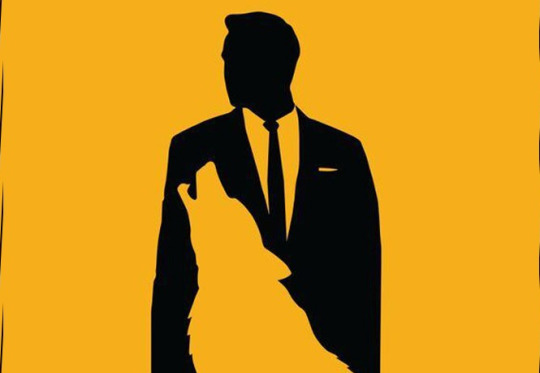
Lu Ping, as you'd expect from a counterpart to Lupin, was much different. In fact, right in his very first story, he was already pitted against Huo Sang and outsmarting him, in a story called "Wooden Puppet Play". The character is inspired by an already existing tradition within Chinese literature of the "chivalrous thief", shapeshifting masters of deception and martial arts, and considered admirable and benevolent opposite to the corrupt government officials they outwit.
His stories are more whimsical, energized, more varied, less dedicated to strict science. He whistles while committing crimes, is identifiable by a red tie and wooden puppets he uses to signal his goons on what outfit he's gonna be wearing, and even cracks asides to the reader. In many aspects Lu Ping is influenced by hard-boiled Western detective stories, and naturally, he has a much more contemptious view of the law than Huo Sang
Well then, was he willing, in his capacity as thief, to represent the sanctity of the law and catch the murderer? Yes, he would be quite happy to round up that murderer. But he wasn't at all willing to boost the reputation of the law. He'd always felt that the law was only something like an amulet that certain smart guys had fabricated to get them out of embarassing situations.
Such an amulet migh be good for scaring away idiots, but it oculdn't threaten the violent, crafty and arrogant evil ones. Not only could it not scare them away, a lot of them hid right behind it to work their evil tricks!
Conflicts between these two are not just rooted in one-upsmanship or the patriotic conflict between the two, but instead in two differing approaches to justice, their influence on fellow Chinese writers to step outside tradition, and the respective ways they address issues in society. Additionally, it's not just a conflict between Great Detective vs Gentleman Villain, but the Holmesian Detective and the Hardboiled Detective. And, naturally, when the two met, a pattern reocurred again.
Writing a Lu Ping tale in his usual manner, Sun Liaohong deprives the detective of the advantage he typically enjoys at the hand of Cheng Xiaoqing or any other follower of Conan Doyle - narration by the detective's coadjutor.
It is Huo Sang who slinks around like a thief, alarming hotel service personnel. He becomes rattled, and even so is vain and arrogant. He is a bit too positivist about searching for clues, and he spends a remarkable amount of time just relaxing and waiting for something to happen.
The figure of "wooden puppets" turns wicked when the author uses the term to refer to Huo Sang, Bao Lang, and the police. Satirizing the genre as a play in which the author woodenly manipulates his character. But Lu Ping as puppet is a genius, moving from one identity to another, whereas Huo Sang is a dumbbell - wooden indeed, bourgeois, ridiculed.
A gentleman's agreement occurs only at the end. Huo Sang has the formal victory. He frees Lu Ping in order to get the paining, but the exhibition is held a day late and it now bears Lu Ping's seal.
In wartime, peace talks, diplomacy and gentlemen's agreements are just smoke screens, the stuff of puppetry. Both Huo Sang and Lu Ping surround themselves with lies to reach their final accomodation. Perhaps they are both puppets - Chinese Justice, the Fiction: Law and Literature in Modern China, by Jeffrey C. Kinkley
Both characters were canned in 1949 when the CCP banned detective fiction, and it was replaced with anti-spy literature about how the party police would expose counterrevolutionary conspiracies. They never got to have a rematch, and to my understanding there were a couple of films made afterwards about them, Huo Sang had a very recent one in 2019, but never another meeting.
I guess the takeaway here time and time again is that, credit to Holmes and all, but:

#replies tag#pulp heroes#pulp fiction#sherlock holmes#herlock sholmes#arthur conan doyle#arsene lupin#maurice leblanc#lupinchads can't stop winning
93 notes
·
View notes
Note
For the Weirdly specific and overly long Critical Role Ask Meme (Please pick and choose if you would prefer): 1, 5, 6, 7, 15, 16, 30, 33
Sorry this took so long anon! I had to pace myself kerngknrt
1.Answered!
5. Meta you would write if you did not fear people would be SUPER weird about it. This is also an invitation to write that meta and block the haters.
How sometimes the fandom just needs to... fucking shut up and roll with it. These aren't our characters - they're probably some of the most complex many of us have ever interacted with, by virtue of hundreds of hours of time spent with each. Sure, you might think there's one way a character should respond to a situation - but in their player (or Matt's) head there's likely a good handful of other factors going into the character's reaction to any given event. Emotional state, stress level, who is around, where they are, etc. Yes this about Percy shut up.
If a character surprises you? Great! Think about why that is - what disconnect you have between what you expected and what happened and what could have prompted that.
What they're presenting is canon - they love these characters more than you or I possibly could, even writing hundreds of thousands of words of fanfic for them. We aren't in their heads. We didn't make them. Instead of trying to reshape canon to fit your idea of what they should be, instead take a chill pill and roll with the punches. And keep in mind that you likely don't have all the information. Going back to Percy - look at that! He and Vex had a whole fucking plan ready we and the Hells didn't know about! Be open to alternative interpretations - sometimes a look is in character, sometimes it isn't, and it's hard to draw that line.
It's a game. Canon is being shifted and rewritten constantly. Stop being dicks to other fans, the cast, and especially Matt when shit doesn't align with your imperfect understanding of the setting or characters. (Or, even if it WAS perfect in the past - the setting and characters are always evolving! A perfectly in character moment for episode 1 Caleb is not necessarily true for episode 140 Caleb. Matt changed the ages of the de Rolo kids and we don't know why. It's canon now unless he decides to retcon it. Form your headcanon around canon.)
6.NPC you would most like to see as the subject of a Tales of Exandria series.
Cerrit's daughter, Maya. She has that orb! What she gonna do with it? I still love the idea she founded the Cobalt Soul, and a POV from during/immediately after the Calamity would be... insane.
7. Alternate outcome in a main campaign that you don't necessarily wish happened, but that you wish you could see played out in an alternate universe before returning to ours.
... Jazzhands @ my 'Vex is the Raven Queen's Champion' AU.
TBH? I think at the table it would have been terrible for Liam to see his PC's twin succumb to that fate and be denied the chance to stop it. But in the campaign man it'd be juicyyyyy
15. Favorite one-on-one conversation (can be between two PCs, or a PC and NPC).
Vax and Percy's conversation in the Raven Queen's shrine. I just - FUCK! So many banger lines. The undercurrent of conflict between them. The framing, with the shrine, what it Means. The subtle shovel talk. damn!!!
16. Favorite group (all/most of the party) conversation.
I... think it might be when Vax emerges, naked, in the Feywild. All the worry, the heartbreak, the slow unravelling of what it means, their initial planning on what to do next. It’s got both solid emotional beats and some good plotting - which? Call be controversial, but my autistic ass loves it when they plan! Yes, narrow things down, discuss your options! Throw out shit ones, at least you’ve addressed why they’re shit! Also - eyeball.
30. What is your favorite theory or headcanon that has absolutely no bearing on the plot and isn't important at all, but which is completely compliant with canon?
Vesper is an aasimar. fuck you. she is and forever will be in my heart. it’s the angel/devil duality, it’s her hair turning white despite absolutely not going through dad’s stressful hell, it’s the fact Vex was pregnant when Pelor blessed her, it’s so many little things that Matter to me!
33. You may ask any member of the cast one, and only one lore clarification question. What do you ask?
I think I’d ask Taliesin “What are, or were, the personalities of the non-PC de Rolos?”. Maybe he’d focus on Percy’s parents and siblings, or maybe on the kids - but given how he elaborated on why Gwen is totally not Percy’s favorite I’d like to think he’d have very complex and rounded thoughts on each. Asking him also opens up the possibility of the past and present family being addressed, vs asking Laura would 100% result in quarter-elf info, and I feel she’d likely focus more on vibes/a few interesting big traits vs how they work as characters?
4 notes
·
View notes
Note
People being pissed about her being in the DOR movie is understandable and fine because WHY (there are so many movies out there and you do not HAVE to act), but I roll my eyes at the way the discourse is often held in the fandom. Which pieces of media you consume is not the no.1 indicator of your moral code, and I dislike how criticism of one of Taylor's moves or conversations about social issues that relate to that just turn into mudslinging with little regard for the actual core issues here. This was especially bad with the Carolina stuff imo, where people overly simplified the very complicated events that happened to slam Taylor, when what should have happened is that people use it as a way to educate themselves about the narratives surrounding poaching and the conflict between wildlife preservation and the living realities of many people in African countries. Like... It's interesting and eye opening! But it is hard to reduce to a two-sentence post. Abuse and transphobia are easier concepts to grasp and I think also closer to many people, making the backlash to the DOR movie a bit bigger - understandably so. I like Taylor a lot and think she has good intentions and genuinely cares about people, but it is disappointing that she chose to work with somebody who has such public accounts of behavior she previously positioned herself against. Sorry if this contributes to the discourse too much, you obviously do not have to post if you do not want to.
all good, i feel fine talking about this now! and i agree with much of what you said. i kinda want to use this as a jumping off point, so i apologize i'm going off course a little!
if someone wanted to unstan and boycott taylor's work due to hypocrisy, that is completely understandable. is it necessary? not to me, but everyone's personal principles are different.
i think being disappointed in taylor and boycotting the film is understandable and also effective! DOR should not be making films. DOR is the shitty human. thus, boycotting his film is the most effective way to get that across. (same goes for one's feelings about the crawdads film!)
what i don't think is effective is making this about "holding taylor accountable" because... whether you believe that's a fan's responsibility or not, taylor isn't going to act just because fans are yelling at her. as a fan, you must accept that she makes some flawed or problematic choices. you don't have to like it! but you have to decide for yourself what that means for your own moral code, not make it your mission to get taylor to change her mind.
honestly it feels like 1) some fans don't know how to grapple with taylor being an imperfect person, and 2) fans feel like they are being activists by pressuring taylor to use her influence as a public figure to do the right thing.
unfortunately that's not realistic. we don't control taylor, and it IS possible, in some cases even likely, that taylor chooses to take on projects despite knowing they're problematic. we literally all make that choice sometimes. forcing her to "be better" because you can't handle her choices is not gonna work but it is a good time to recognize that the only person you control is yourself. and a good time to recognize that morality isn't a zero-sum game and it's okay to give grace to people even when they do problematic shit.
so, the sooner fans can separate their own morals from the morals of a celebrity (even when the celebrity is taylor swift), the better off they'll be.
5 notes
·
View notes
Text
Satanism - a way to embrace Pluto?
My mind has been occupied with Pluto lately, the planet, god and symbol of “the hidden things”, the occult, the underworld, darkness, fate, rage, destruction, transformation, abduction, man’s primitive nature, life and death, power and powerlessness, fear, violation and fertility. There’s so much nuance to all planetary (archetypal) principles and there’s always more to explore. Pluto especially is a mysterious and threatening figure (force) in our lives and in the world at large. I have talked about it in previous posts, here / here and here… I’ve also explored the 8th house, which is the astrological house of Scorpio and Pluto here and here.
Many people understandably avoid anything that has to do with the darker elements of life and human nature until they are forced to deal with them. This is possibly why Pluto has been associated with violence because we are typically dragged into the depths; we don’t go there willingly. Some people, however, have lives that are marked by Pluto to such a degree that they can’t pretend that he doesn’t exist. By deciding to consciously accept him and embrace his influence it is possible to live a richer life. After all, Pluto is not only a god of destruction; he is also a god of riches. It seems to me, that the worship of Satan (as practiced by members of the Church of Satan) is very much in line with Pluto’s gifts and his riches. It’s an attempt to embrace the carnal nature. However, this Plutonian carnality is not as basic as it seems. It has its own intelligence, its own spirituality and its own laws. It seems to me that Pluto has to do with survival – psychological, emotional, spiritual and physical. He stands for survival and life at all levels of the being. As stated on the official website, “To us, Satan is the symbol that best suits the nature of we who are carnal by birth—people who feel no battles raging between our thoughts and feelings, we who do not embrace the concept of a soul imprisoned in a body. He represents pride, liberty, and individualism—qualities often defined as Evil by those who worship external deities, who feel there is a war between their minds and emotions.”
I think, that this philosophy attempts to treasure the whole (hu)man, to recognize his divinity even in his subjective thoughts and feelings. It’s an attempt to honor the darker aspects of human nature – anger, rage, and instinctual responses. It’s essentially to honor the earth, the dark void, and the merciless existence. Putting faith in external deities is robbing the individual of his divinity; it’s separating him from life. Christianity has, at least in part, made people think of Evil as an autonomous force (an external deity), corrupting good souls and creating fear and panic. By avoiding seeing reality as a whole, Christianity perpetuates fear instead of confronting it. As I understand it, Satanists don’t invest belief in any gods (symbolic of human drives and instincts) because they see that these mind-made constructs are part of their own psyche. Satanists place themselves at the center of their own subjective universe without seeking to befriend or worship mythical entities that are separate from them.
It seems to me though, from studying astrology, that there’s no way to escape deity. In the effort to not have any god, to place the self at the center, as is characteristic of the Church of Satan, one is in fact aligning or siding with an archetype. It’s impossible not to. I think this is made quite obvious when using astrology and analyzing natal charts. The archetypal energies are expressing themselves through and as the individuals.
In fact, let’s take a look at the chart of the founder of the Church of Satan, Anton Szandor LaVey. I would expect him to have a strong Pluto because of the emphasis on embracing the carnal side and the spiritual dimension of it. There’s also a big emphasis on being whole (a solar principle) through recognizing the totality of life, facing the strength and power within oneself and using the necessary tools to improve one’s own life. This would include consciously using symbols and images (like the image of Satan) in order to get the desired effect. If symbols are given autonomous power it’s a problem only if it puts the individual in a disempowered position. Personal integrity and liberty is also of utmost importance, which sounds rather Aquarian to me. Let’s have a look.
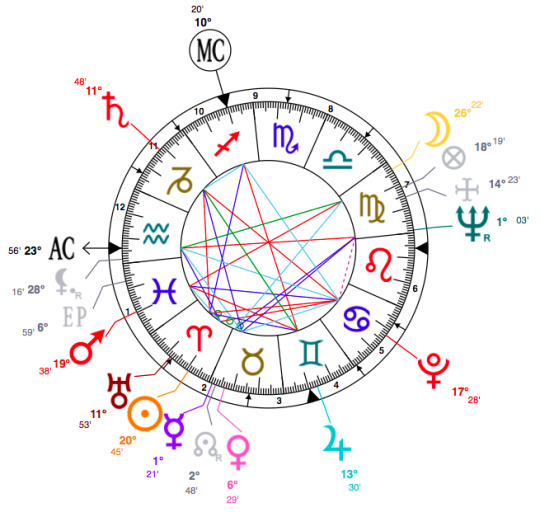
The chart of Anton Szandor LaVey, as found on astrotheme.com.
The Sun is in Aries, which is not surprising considering his strong faith in individuality, his initiative to start a “new religion”, to provide a contrasting influence, to place himself at the “center”, to go by no other rules than his own, to welcome opposition, the desire to be his own master and a leader of his own life. Aries as a sign is strongly linked to the warrior archetype, of fighting for what one believes in without compromise, to claim authority in spirit, to conquer, to place subjectivity over objectivity (because there’s no real difference from the perspective of Aries). Selfishness is the basis for existence; it is through honoring the self that one can honor other people’s independence. Mars, which is the planetary ruler of Aries, is concerned with personal strength and potency (note; Mars is sometimes referred to as the lower octave of Pluto). It seems like LaVey lived on his own terms, relying on his own natural instincts and gifts to get by in life. This is all very typical of Aries people, to live of off a self-generated optimism and conviction of one’s own ability. “The rules don’t apply to me” is the overall sentiment – the rules originated somewhere and that which originates from my own self is no less valuable or divine, even if it’s raw, ugly or imperfect it is still of “The Self”, the force that animates existence.
To no surprise, Pluto makes a square aspect to his Sun. He would’ve lived with the threat of his own destructive rage, his own inner violence and uncompromising desire. To him, it was probably difficult to consciously accept this side (the square aspect always represents a conflict) but he certainly tried to acknowledge his “darkness” through founding the Church of Satan. A person with a trine aspect between Sun-Pluto would not have been as motivated or pressed to bridge the gap between the self and the primitive and taboo because there wouldn’t have been anything to bridge. The square relationships between two planets usually motivate the individual to try to solve dilemma of conflicting principles within the psyche through external work. Squares usually force work in a very concrete fashion. When a person is serious about something, and is trying to make something happen it’s usually indicative of a square aspect within the personal chart. For example, I have a Neptune square Mercury aspect. I try to read and write and educate myself to some kind of higher state, some transcendent and elevated experience because the connection is not smooth between these planets. I try to articulate things properly in order to bridge the gap between personal mind and the nuance of collective feeling. I try to reflect the essence or feeling tone of energies through my writing.
The interesting thing about LaVey is that he truly took on the appearance of a devil – he was probably aware of the power of looks, the impact that certain clothing or symbols have. He was undoubtedly theatrical. Pluto in the 5th house might have something to do with this, as it’s the house of individual expression. The 5th house is all about personal creation; it’s the realm of children and play. In a sense, he was no different from a child dressing up in costumes and playing “the dark one”, which is probably why people mocked him for it. Even when Pluto is in the 5th house it is never light-hearted, he is all in, ruthlessly determined. Pluto placed in this house takes play seriously. He takes personal expression seriously. His creations are his and he should be at the center of them. The individual should be credited for his abilities, not the other way around, just as the individual shouldn’t be appreciated because his gifts are “of the gods”. They belong as much to the individual as it does to the deities. This is certainly the spirit of Pluto. He answers to no other god than himself and he sees life as it is, in its most vile forms, without flinching. Life is in all expressions, in the primitive as well as in the sophisticated. This is, in many ways, a deeply honest way to live. Another thing that catches my attention is the bi-quintiles Pluto makes to the MC (public image) and the AC (personal image/persona). The bi-quintile aspect is generally considered to say something about a certain talent or style, a mercurial quality or skill. He truly has the style of Pluto, both in his countenance and in his societal achievements. He looks dark and mysterious, preoccupied with the occult side of life. Perhaps he even had a certain talent for “magic”, at least he claimed to.
Satanists believe in indulgence (which doesn’t imply compulsion) over abstinence, primarily because there’s no belief in heaven or an after life. The individual is placed at the center of his own universe as his own master – through and through. Although many people would agree that self-mastery is a good thing, many also tend promote, in the same vein, that “people make mistakes” and that they “should be forgiven”. As I understand it, Satanism as a philosophy would state that mistakes are only mistakes if the self-mastered individual firmly believes it to be so in complete honesty and integrity. Self-deceit is considered to be a sin, unless of course it’s done intentionally - it would then not be a sin. Going along with roles that other people have cast one in is self-deceit – that is, for example, shouldering the role as a “sinner” because other people have imposed that label or role onto you is not indicative of self-respect, it’s a betrayal of your own reality. Notably, LaVey has an Aquarius Ascendant, Lilith in Aquarius in the 1st house and Uranus widely conjunct his Sun (both in the independent sign of Aries). He is definitely not a person to follow the herd – in fact “Herd Conformity” is one of the Cardinal Sins in Satanism. He leads life through the principle of being his own godhead, his own intellectual genius, and his own unique and separate individual, detached from the norms and conventions enough to go against them if he pleases. Aquarius is a sign that considers the map of life in an intellectual sense. This sign is also the sign of the progressive individual, someone who wants to make a difference on a larger scale. He certainly did, through constructing a thought-system that could benefit people. It’s no wonder that the first of the Nine Cardinal Sins (as found on the official website) is Stupidity. Of course it would be to an Aquarius Rising! “Think for yourself; don’t go along with everything you’re told” is the plea.
#pluto#astrology#planets in astrology#satanism#aries sun#aquarius rising#pluto in astrology#devil worship#plutonic forces#natal chart analysis#natal chart#satan#darkness#darkness and light#anton lavey#natal chart exploration#deity#religion#embracing pluto#individualism#philosophy#liberty#pride#power#sun square pluto
43 notes
·
View notes
Text
Adventure, 02, pragmatism, and humanism (morality of fighting, conflict resolution, the importance of personal choice, etc.)

Adventure and 02 are naturally very idealistic series, but despite being idealistic, there are times when they can get rather pragmatic -- even uncomfortably pragmatic in ways that seem a bit unusual for a kids’ show. The entire last quarter of Adventure and almost all of 02 dealt so heavily with the topic of “is it okay to fight, even if it means incurring deaths?" to the point it’s pretty hard to miss, but both series have an approach towards the morality of fighting, the possibility of potentially having to kill enemies (including former friends that have turned antagonistic), the approach to dispute resolution, and the meanings of “moving forward positively” and “not getting hung up on needless negativity” that are surprisingly nuanced. At times, there’s even a strong message that warns against getting hung up on preachy principles that sound noble on their face but actually don’t get anywhere in practice.
This is a handful of topics, and it’s to the point where it may seem a bit strange to condense all of these under one meta instead of dedicating separate posts to it, but I decided to on the grounds of the fact that they’re all very tied to each other in the course of Adventure’s narrative. Overall, both series are very kind to the feelings and mentalities and thoughts of the young children involved, having the characters not only be kind towards each other but also encouraging the audience to understand their feelings. This is an approach towards understanding oneself and others that happens to be very applicable to life in general, even for adults; both series float a balance of being pragmatic and yet humanistic, kind to the struggles and internal thoughts of all of the characters within, and have a surprisingly nuanced look at what it means to take part in conflict and what the “best thing to do” in such a case is.
As said above, this is a long and complicated meta, and it’s to the point where I’ve considered separating it into multiple parts or posts, but in the end could never bring myself to because of how interrelated all of these topics keep ending up with each other. So, to spare those of you who are intimidated by the sheer length and winding-topic nature of this, here are the main points:
One who is not emotionally ready to fight, or is unwilling to fight, should not be forced to fight. On top of it being inhumane, emotional exhaustion is treated much in a way similar to physical exhaustion; especially in a world where fighting strength is linked to emotional will, one whose heart is not in it will not even be able to effectively fight in the first place. Even when joining the fight is the obvious ideal solution, one who needs to sit out should not be blamed or scorned for it. A choice to fight is exactly that, a choice, not an obligation; the world is messy and imperfect, and the most you can do is try to do whatever you can within the best of your ability. If you do, there is no reason you should be scorned for it.
There are many meaningful ways to contribute to the overall fight that don’t necessarily involve direct physical violence; those ways are still valuable and necessary, and those more attuned to those roles should embrace those roles if it makes them more comfortable to do it that way.
If an extreme result -- such as killing the enemy -- is reached, it needs to be done with the first and foremost priority being to protect people and prevent casualties. A diligent effort should still be made to preserve as many lives as possible (which means this isn’t something where you get to go all “knight templar” and beeline for a violent solution) -- but sometimes, there will be times when push comes to shove and that most extreme solution will have to be reached, even if that “enemy” was originally a friend, because inaction will very obviously lead to more people being hurt.
When a dispute about important points like the above is reached, everyone’s feelings must be acknowledged. This is not to be confused with philandering around with a “both sides have a point!” compromise; in fact, Adventure and 02 both make very firm stances on the above issues. Rather, it makes it clear that said points need to be made while not invalidating the other person for having those feelings -- that is to say, there’s a huge difference between “your opinion is wrong” and “you are stupid and unreasonable for having that wrong opinion.” Dispute resolution and understandings can only be reached when you properly understand why the other person came to that conclusion, and treat them with proper empathy and compassion while you try to work it out. You don’t have to acknowledge their point, but you have to acknowledge their feelings. (For those of you who have seen Appmon: Shinkai Haru is a master at this technique, and there are multiple times during the series where he will very assertively make his case against others while still appealing to the other person’s feelings and never denying their right to have them. This is also an extremely useful technique for dispute resolution in general, and I recommend that those reading this consider employing it more often, at least assuming you’re dealing with someone who’s open to listening.) Likewise, to truly reach out to someone and support them also requires understanding their feelings -- you can’t truly “support” them unless you’re capable of doing so.
There is a certain limitation in which adhering too closely to “moral principles” ends up becoming impractical, and don’t end up contributing to anything in the long run -- fixating over things like grudges, revenge, “punishing” people, and even the concept of forgiveness can quickly turn into platitudes. The best way to move forward is to not fixate on those principles or get hung up on the past, and rather think “now that we’re at this point at the current moment, what’s the best way to move forward in a way that helps others the most and minimizes harm?”
Adventure and the morality of fighting, and the necessity of personal choice
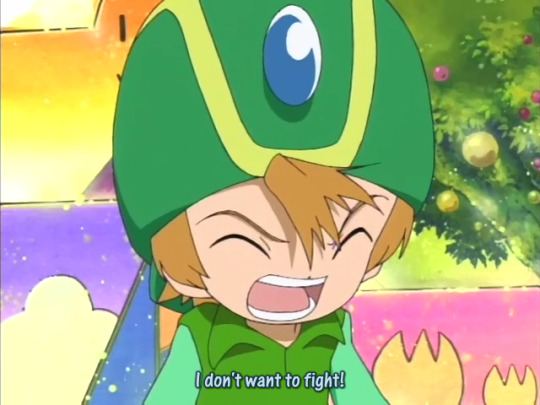
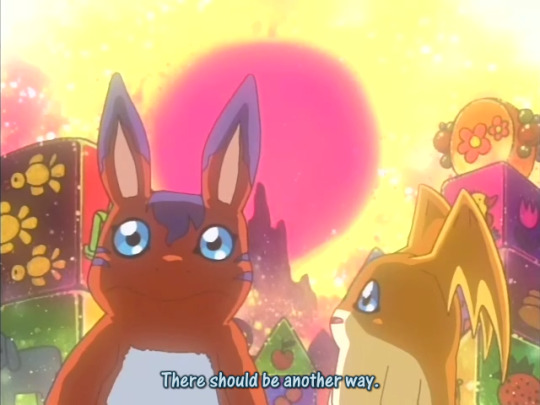

Believe it or not, the question of how feasible pacifiism is was first brought up as early as Adventure episode 12, when Takeru states that he has no intention of fighting Devimon. Elecmon calls this mindset out for the naivete of thinking they can just waltz up to Devimon and ask for answers instead of him trying to murder them on the spot -- and, in fact, he is completely right, because Devimon is not someone who can be reasoned with and indeed immediately tries to murder everyone on the spot one episode later, which results in Angemon’s death and Takeru trading out this very idealistic, naive mindset for the no-compromise, strict anti-darkness stance he takes in 02.
So there are two things to get out of this. The first is that, while Adventure and 02 are certainly very idealistic series, they are absolutely not naive. There are bad actors out there like Devimon who can’t be reasoned with whatsoever. Already off the bat, we have a clear statement from Adventure that an “everyone should stop fighting and get along!” mindset, when applied ad absurdum, is not going to get anyone very far.
The second is that none of the Adventure (or 02) kids like fighting. Takeru’s reaction here is certainly as extreme as it is because the idea of “fighting” presumably triggers his trauma from his parents’ divorce and the resulting split, but there’s no actual indication that any of these kids are necessarily fond of it. Certain ones like Taichi might get a little cocky midway through the battle when they’ve gotten it in the bag and are on an adrenaline high, but there’s also no indication that they’re interested in beating stuff up for the sake of it. Note that all of the fighting in Adventure episodes 1-10 was done out of sheer self-defense, and no Digimon was killed in any of the resulting battles (we’ll assume that the giant Bakemon in episode 11 doesn’t count mainly because it’s already dead) -- it was always fighting to the minimal amount to chase the attacking Digimon away or get them off their back. And, in File Island, that was possible -- but starting from the Server Continent and after, the hostile Digimon were actively out to kill them instead of just being territorial wild Digimon, forcing the Chosen Children to up the ante in order to survive.


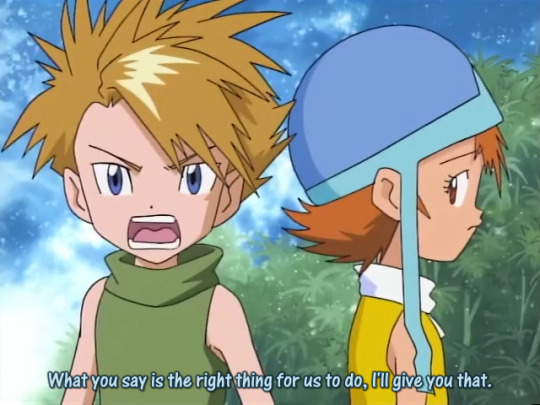

The issue of “whether fighting in itself is the right thing to do” is brought back in the Dark Masters arc, and this is also where we start getting a discussion about the disparity between “the right thing to do” and “whether one is capable of doing said right thing to do”. Mimi, the most emotionally sensitive of the group, starts having an emotional breakdown over whether they should keep fighting and potentially drag in more casualties -- especially because the Digimon that had died had all done it for their sake in order to continue the fight, and therefore the Chosen Children are indirectly responsible for their deaths. Yamato thus explains the difficulty of the situation: he himself agrees that Taichi’s evaluation of the need to push forward and continue the fight is the right thing to do, but it’s inhumane to not consider the stress and and emotional toll this is causing and force everyone to continue in spite of that.
In addition, Taichi’s reasoning for why they should continue is “revenge” -- a very negative, spiteful reason very tied to “fighting for the sake of it”. It’s understandable for Taichi to have these feelings, but he’s going at it from the wrong direction, and he’s overall being very insensitive in this scene. Later, in Adventure episode 45, he says that he’s doing it for the sake of honoring the Digimon who died for them. In other words, a lot of the reason Taichi’s methodology isn’t working is that he’s hung up on “the principle of things”, and not the more pragmatic reasons one should fight.
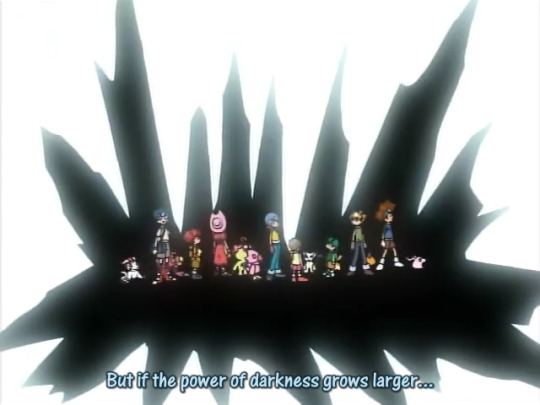
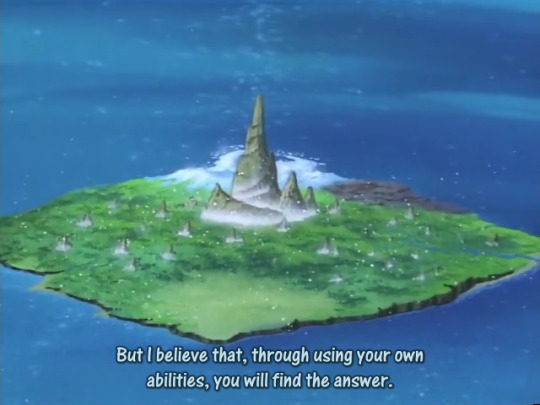
In Adventure episode 45, the kids finally meet the entity who chose them in the first place, who self-identifies as “the one who wishes for stability” -- the novels name them “Homeostasis”. Note the name -- it refers to the maintenance of internal balance within a living system, and Homeostasis themself starts their long infodump with their motive: it’s not that they want to eliminate all darkness from the world entirely, but that the powers of evil are upsetting the balance so badly that everything will be consumed if something isn’t done. It’s not like they’re insistent on violence either -- it’s just that they have a world to protect. The novels give us a particular amount of extra information on this entity, namely that it is not an omnipotent god by any shake of the imagination (in fact, there’s even an implication that there are higher powers that they themself don’t understand), and rather just a mere security system that observed that things were going south and used its rather limited methods of communication (via the Agents) to help make preparations.
Regardless, back to the episode -- we learn that the reason this entity recruited human children into all of this was because of the Hikarigaoka incident in 1995, which displayed to them and the Agents that a bond between children and Digimon could allow Digimon to evolve spontaneously, something that’s not possible with Digimon in the Digital World alone. Oh, and also, that they’ve been wanting to talk to them since File Island, and this entire thing about being cryptic with information was because they literally had no body and there was a massive amount of information loss after the Dark Masters blew up the Agents’ base and killed everyone except Gennai. In other words, just like with all of the actions the Chosen Children had been taking up until this point, everything Homeostasis and the Agents did was out of desperation because they were running out of other options to save their world, and during their brief time of being able to speak with the children, Homeostasis dumps pretty much everything they need to know and speaks to them using the extremely deferential sonkeigo form, meaning that they consider everything the kids are doing to be a massive favor to them. (Contrary to common belief, their possession of Hikari’s body does not seem to be non-consensual, given that they spend multiple episodes trying to contact her, and are clearly depicted having a proper conversation with her before temporarily borrowing her body.)
Most importantly, at the end of their speech, Taichi asks them what to do next, and the response is effectively: “We don’t know, but we trust you to make the best decision.” So, again: fighting as a Chosen Child is not an obligation, but something done because they want to do it and can. They were handed the tools to get this done by Homeostasis and the Agents, who believed in their potential to create miracles and be virtuous people and do something to save their world beyond what the native Digimon could do alone out of desperation and a lack of other options, and they are not hovering over the Chosen Children to see if they’ve “succeeded” or “failed” (note that they seem to have no sense of grudge or disappointment over Taichi’s SkullGreymon stunt in Adventure episode 16, explaining it very neutrally as an example of a risk), but more “we believe you were the best people who were able to do it and we trust your ability to help us.” (This is especially because, while it’s made clear they’d been wanting to contact them for a while, their most direct intervention comes right after Yamato had questioned why they were chosen in the first place -- presumably, they felt that the kids deserved an answer.)

At the end of Adventure episode 45, Mimi, considering the fighting they’re doing to be responsible for all of the fallouts and the sacrifices, decides that she won’t participate anymore, and Jou decides to stay with her in order to convince her to come back (although the novel also reveals that he himself is having doubts, too). Very importantly: nobody begrudges Mimi for being emotionally overwhelmed and sitting out, and nobody even begrudges Jou for choosing to stay with her. This is smack in the middle of the Dark Masters arc when everyone needs all the support they can get -- but after everything that had just happened, it’s inhumane to force either of them forward in this condition.
Despite his doubts, however, Jou himself is already coming to understand the limits of “pacifism” at a time like this:
What he wanted to tell her was this: that he didn’t see any likelihood of co-existing with the Dark Masters, and that they had no other choice but to fight them. Even a neutral country like Switzerland had a military. They would be invaded by enemy countries without one. It would be nice and ideal if they used the nonviolent resistance approach as Ghandi did. But that didn’t mean it was okay to just be killed without lifting a finger… But not even he could find a good answer.
Again: Adventure and 02 are an idealistic series, but they are not naive. It would be nice if the fighting could all stop and everyone would be happy, but there are malicious bad actors who will take advantage of you sitting there and doing nothing.

And so, Leomon dies in Adventure episode 47, and Mimi and Jou learn the hard way: if they do nothing, people will still die. Mimi had witnessed all of the Digimon sacrificing themselves for the Chosen Children’s sake, and thus had followed the logic that their friends would stop dying for them if they stopped fighting, but now that they’ve stopped fighting, said malicious forces (in this case, MetalEtemon) went ahead and killed their friends anyway -- and they’ve gone and destroyed the Village of Beginnings to boot, preventing any of them from being reborn. So in other words, if the intent is to “prevent casualties”, as it turns out, inaction didn’t actually prevent casualties.

Nevertheless, Mimi does not like fighting. In fact, Jou doesn’t like fighting either. Both of them now understand that it’s the best thing to do in this situation, but is it really the best thing to do to force them into embracing violence because of this? Instead, Jou determines in Adventure episode 50 that the overall fight doesn’t necessarily mean that everyone has to jump in and get violent -- the likeable and friendly Mimi has started to cultivate a skill in getting other people to rally behind her, and Jou is starting to consider that he may have a future in treating the wounded and supporting people before they become casualties. Those are still valuable ways they can contribute without forcing them into doing things they can’t bring themselves to do -- and, indeed, Mimi’s rallied army ends up saving everyone’s rears in Adventure episode 52.


While Taichi is not there to personally witness this discussion, Adventure episode 50 has him make a slightly less reckless tactical plan, and he explains (directly citing what happened with Yamato, Mimi, and Jou as his rationale) that he’s learned that he needs to take into account the potential for there being collateral damage. Recall that, earlier, his motive for doing things had been on a sheer principle level, with a lot of negative emotions of spite and revenge. But now, he’s come to understand that the most important thing he needs to do is to “prevent sacrifices”, and that’s the reason they still need to fight. Hence, why Taichi makes a proper plan for doing it instead of just doing the first and most aggressive thing that comes to mind, since he’s a soccer captain and has the potential for being a bird’s eye tactician, after all -- this time, he just needs to channel it in a way that prioritizes the lives of people around them.
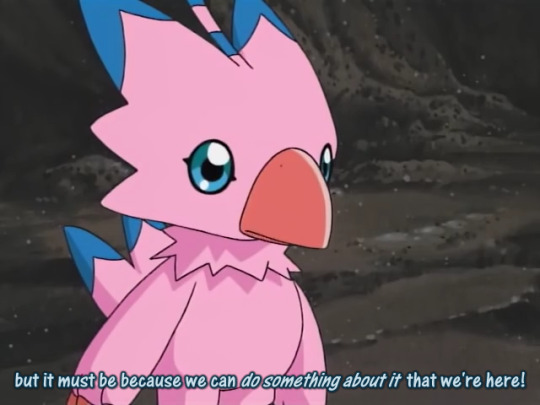
And in Adventure episode 51, when reaching out to Sora (who’s cracking under all of her self-imposed expectations and sense of duty to others), Yamato and Jou take what they learned from Homeostasis six episodes prior and apply it -- Sora is working under the mentality that they have an “obligation” to get this done and that they are impending “failures” if they don’t (and, to be fair, if they don’t make it, the world is going to end, which is pretty unambiguously terrible). But what Yamato and Jou do is reframe it to fall more closely under the philosophy of what Adventure is saying here -- the fact they can do something about it is already absolutely incredible. (I mean, not to sugarcoat the fact that the world is still going to end if they pull it off, but the stress, self-hatred, and self-blame of “we’re failures for not pulling it off” is definitely not going to help.) They are doing everything they can right now, within their reasonable abilities. If they end up not being able to do it, that’s not something that should be considered a sin or a failure on their part; they are here because they can and want to and are doing it and are here to make the best possible use of that.
It’s one of the many times Adventure and 02 will make this statement, indirectly or directly: despite the title of “Chosen Child”, the Chosen Children do everything they do because of their own choices, and because they want to, not because they have to.

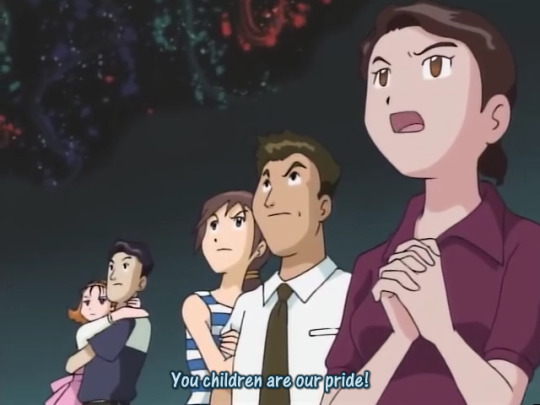
We finally meet Apocalymon in Adventure episode 53, and we learn that he(?)’s a combined spirit made up of all of the Digimon that were “eliminated” and failed during the evolution process, and is deciding to take out its anger and spite at the world out on everyone else by “denying evolution” (this is clarified in the novel to also be the reason it subtly influenced the prior enemies to destroy everything and especially the Village of Beginnings, because it functionally would put an end to the Digital World’s evolution by reducing it to nothing). So, in the end, we have a contrast between Apocalymon, who’s fighting for the sake of self-centered spite (including wanting to take down everything with it in Adventure episode 54 even when its demise is already clear), and the Chosen Children, who are fighting to protect their loved ones.

Incidentally, we also learn in Adventure episode 53 that there were Chosen Children who put an incomplete seal on Apocalymon prior to the ones in 1999. (Kizuna also introduces Menoa Bellucci, who became a Chosen Child in 1997, and assuming you’re following Adventure’s background doubling-every-year lore, at the time of 1999, there were a whole eight other Chosen Children besides Taichi’s group in existence.) The novels make it clear that the time dilation and distortion was going all the way up until the defeat of Apocalymon, long enough that the partners of those older Chosen were able to evolve to the Holy Beasts (and possibly enough for said older Chosen to get really faded through Digital World history to the point even Gennai doesn’t know about them). So the point here is that in the grand scope of the entirety of Digital World history, Taichi and his friends are not particularly singular existences -- there are people who saved the world before them, and 02 will introduce people all over the world who are going on their own adventures (including the main 02 kids in Tokyo), and, of course, by the time of the 02 epilogue, everyone’s going to have a Digimon partner. Koushirou later observes in Two-and-a-Half Break that there’s nothing special about having a partner in itself.
Does that make Taichi and his friends’ adventure of self-growth and saving a whole two worlds somehow insignificant, just because it’s not particularly unique? No. Because, again, they did this all not because of whether Homeostasis chose them or not, but because all of it was operated by their own will and strength and desire to protect others, all within the restraints of what they could feasibly do and handle, and they are amazing people for pulling that off.
02 and the importance of mutual understanding (and, also, more about the morality of fighting)

Before we proceed onto the 02 analysis, I think it’s important to establish a bit of important context about how 02′s lead protagonist, Daisuke, approaches things, and how it relates to the recurring debates on the morality of fighting throughout the series. In 02 episode 14, we learn that Daisuke was captured at Big Sight during the Odaiba Fog incident, and therefore witnessed, firsthand, the threat of Vamdemon’s lackeys attacking innocent civilians (something that Miyako, who witnessed the self-contained Omegamon vs. Diablomon battle on the Internet, and Iori, who only happened to be on a grounded plane after the Vamdemon fight had already ended, did not quite have anything on the par of). Spring 2003 and the Adventure novels elucidate what was going on in his head at the time: he was frustrated at his inability to protect his loved ones, and wished to have the power to fight the “bad guys” who were threatening everyone.
Remember this for later.
Moving onto 02 itself. 02 is a series about relationships, but, more significantly, it’s a series about the sheer amount of work it takes to maintain relationships, and especially the principle that “maintaining a relationship to another person requires being properly aware and understanding of the other person’s feelings.” One thing that often frustrates me about a lot of media (both kids’ shows and non-kids’ shows) and, well, to be honest, a lot of people in general, is the preaching of supposedly “positive” platitudes that actually go straight into what’s called “toxic positivity” for good reason -- because while it’s ostensibly “positive”, it also denies other people’s feelings, waving away everything negative and going “yeah, well, positivity!” and “optimism!” and “power of friendship!” and all sorts of stuff that are actually dismissive because they’re not showing any real effort to properly understand the other party and acknowledge why they feel this way. Like, sure, you may be telling someone to cheer up, but it also carries an (accidental or otherwise) implication of “you’re irrational and stupid for being upset and you should be smiling all of the time because ~positivity~.”
There is a lot of conflict in 02 -- especially because the theme of the morality of fighting is even more relevant, particularly in the case of the added question of “when the enemy in question is not an unambiguously evil sadist but a former friend in trouble”, and later the question of how someone who’s done horrible things in the past but is clearly making an active effort to make up for it should be treated. Daisuke, 02′s lead protagonist and carrier of a lot of its main themes, is ostensibly a simple-minded idealist, but even his theory of “positivity” and “always moving forward” has a lot of nuance beyond what you would usually see in this kind of anime lingo.



Context is also very important here. Adventure and 02′s stance being about “doing the best you reasonably can in a given situation”, it also means that what might be the best thing to do will change depending on context. 02′s starting circumstances are very different from Adventure’s, because it starts off without the threat necessarily being immediately world-threatening -- certainly, they need to stop the Kaiser, but this is in the form of a long-term territory war with an enemy who (at the time) doesn’t appear at night, and it’s unclear just how long it’ll take. This means that when the threat is not immediately world-ending, none of the kids are ever given grief for prioritizing their own personal obligations in lieu of fighting.
Iori and Jou do choose to ditch their kendo lesson and prep school exam (respectively), but they make it clear that they did this out of personal choice, and in fact this conversation opens with Armadimon apologizing to Iori for giving him grief for not coming, because he thinks Iori is perfectly within his rights to have stuck with the lesson! Perhaps, if the world were to end in a few hours, it would certainly be pretty idiotic to insist on sticking with a kendo lesson or prep school, because those things aren’t going to exist anymore if the world ends, but this is a very long and drawn-out territory war with no known end, and it’s understandable that these kids need to maintain their life necessities while straddling the balance between the war and their lives as a whole.
Again, they’re doing the best they can, and being a Chosen Child is about doing things because they want to, not because they have to.

This is especially because the Kaiser himself attempts to exploit the meaning of a Chosen Child in 02 episode 3 -- again, being a “Chosen Child” means being trusted to do the right thing with what you’re given, but the Kaiser basically betrayed that trust, and nobody was able to stop him from exploiting it and attempting a takeover with it. And Ken takes that title of “Chosen Child” and interprets it to mean he’s entitled to all of this -- but the other kids are Chosen Children just like him, and (at this point) all of them are simply choosing to do whatever they want with that.


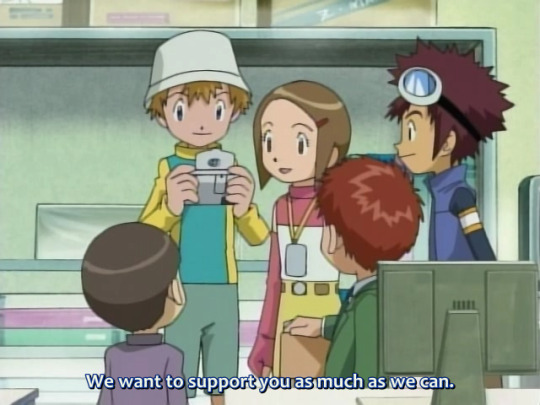
And on the flip side, you have the Adventure seniors, who are a little nerfed by the Dark Towers, but as far as the way the younger 02 kids see them goes, there is no doubt that the 02 kids respect them deeply and are practically reliant on their support and advice, and their experience and maturity in comparison to themselves. The episode that establishes most how in awe the 02 kids are of their seniors is 02 episode 17, where they learn the details of the adventure in 1999, and so it’s not about how much combat power they’re displaying right now but rather how much experience they have in doing such amazing things. Likewise, their seniors are frustrated at their inability to help -- not because they see it as some obligated duty, but because they see their juniors trying their best to deal with an ongoing crisis and want to help, resulting in them providing support roles such as covering for them with a camp trip in 02 episode 18 and allowing them to do a long-term Digital World stakeout. For this, the younger 02 kids adore them and give them all of their respect.
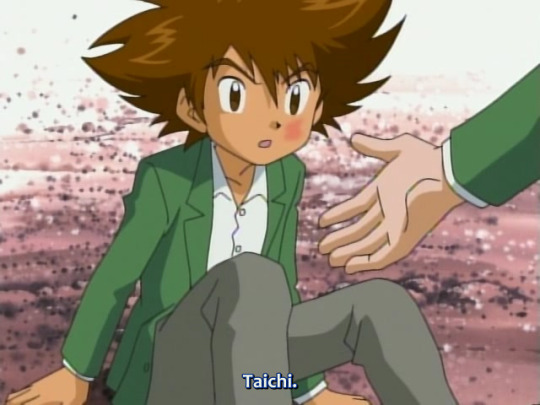

02 episodes 10-11 are significant in juxtaposing the themes of “conflict” and “understanding each other’s feelings” -- at the end of 02 episode 10, we see Yamato punch Taichi, but he holds his hand to him right after, indicating that Yamato punched him not out of anger or condescension or scorn over Taichi’s hesitation to fight Agumon, but rather simply to snap him out of it for his own sake, knowing he wouldn’t take it offensively, so in other words, what looked like a “conflict” on its face was actually communication between the two, with neither of them treating each other with scorn.
The conflict at the end of the episode is over whether they should run the risk of killing Agumon in the process of fighting him to get him back from the Kaiser’s Evil Spiral-induced brainwashing (note that this is about the risk, since it’s not necessarily guaranteed they’ll have to kill him, and they still of course need to make a conscientious effort to prevent that outcome). Yamato, however, frames it in terms of very practical matters, and even takes Agumon’s own feelings into it while he’s at it: if they pull back purely for the sake of not running that risk, Agumon will end up being the Kaiser’s slave and killing machine and nothing will be resolved, whereas if they run the risk, the best outcome is that Agumon is saved (which is, fortunately, what happens!), and the worst outcome is that he’s killed, which is still a preferable outcome to him having to remain the Kaiser’s brainwashed slave used to kill other things en masse.
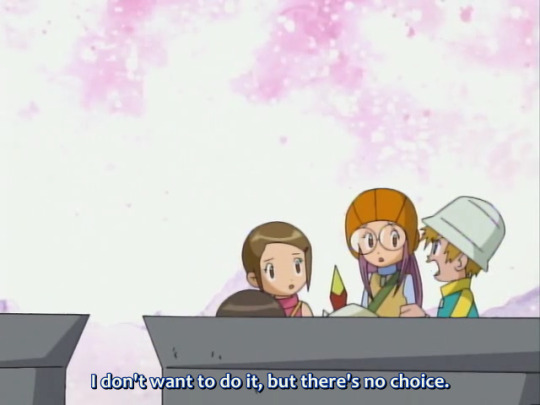
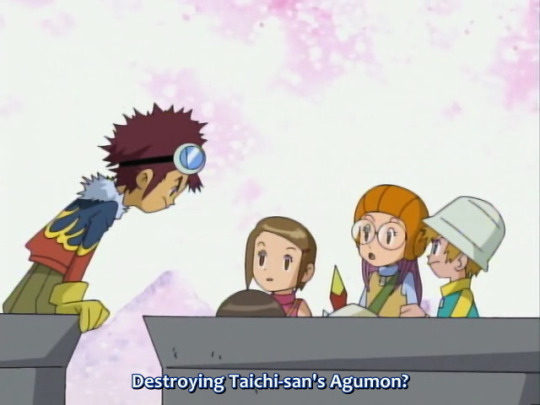

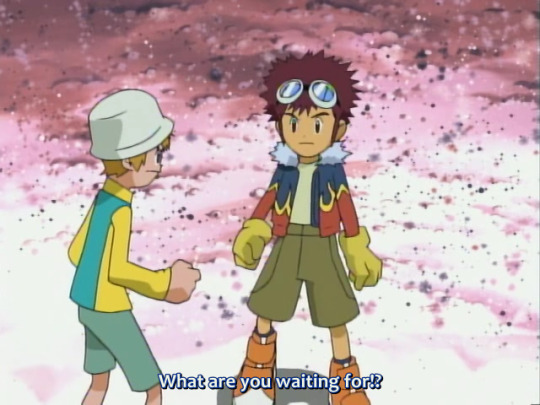
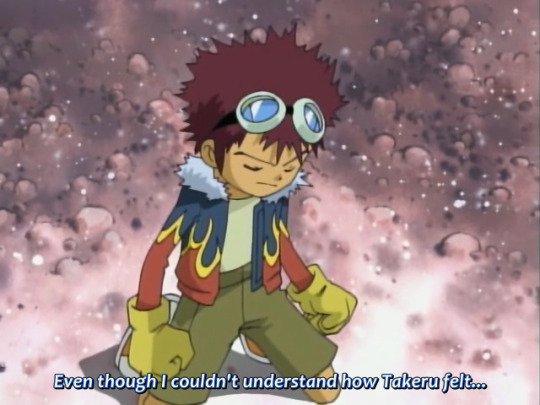
02 episode 11 further explores the theme of conflict in the face of “understanding each other’s feelings”, as it starts off with a fight between Daisuke and Takeru on the grounds of whether it’s okay to risk killing Agumon. Takeru’s stance is to side with Taichi’s decision, even if he doesn’t like it (again: just because some of these kids are able to make these decisions doesn’t mean they like it, and they’re doing it not because they’re callous but because they’ve thought hard about it and have decided it’s the best option they have!). Daisuke, being a bleeding heart, is appalled that Takeru could so easily endorse killing Taichi’s partner, and the two fight.
Note that the series does not “both-sides” this issue -- Taichi and Takeru’s stance is basically treated as the optimal course of action here -- but it also doesn’t invalidate Daisuke’s feelings of understandably being very shocked and appalled by this! Taichi and Yamato, in what initially seems like a violation of common sense, encourage them to be allowed to continue fighting, saying that it was essential to their friendship, and that confuses everyone present at the time -- but the meaning becomes clear by the end of the episode, when Takeru’s own Patamon is momentarily taken by the Kaiser and put at risk of himself becoming an Evil Spiral slave. Takeru blows up at Daisuke for hesitating (remember, this is one of his triggers), and eventually runs the exact same risk he’d advocated for Agumon with his own partner.
Remember what I said about “toxic positivity”? If everyone had just forced Takeru and Daisuke to shut up for the sake of “not fighting”, both of them might have remained angry at each other and stewing in silence, but because of the conflict, Daisuke himself personally witnessed Takeru run that risk for his own partner, presumably for the same reason (as much as the potential of Patamon being killed hurts him, the idea of Patamon being used as a killing machine is even more panic-inducing for him). With that, he understands that Taichi and Takeru made the decision to go ahead with this not out of callousness or cruelty, but because they sincerely felt they had to, no matter how much it pained them. Daisuke rails on himself for not understanding Takeru’s feelings better, and considering that he and Takeru never get in this vicious of a fight again, the point is: it wasn’t about whether they should form a friendship by fighting or not fighting in itself, it was about the fact that the two of them were able to get their feelings on the table, and that Daisuke was able to understand why Takeru endorsed what he did. (And this, too, is what it means for why Taichi and Yamato are friends now because they fought so much in the past -- back in Adventure, those fights ended up having them bare some very raw feelings to each other.)

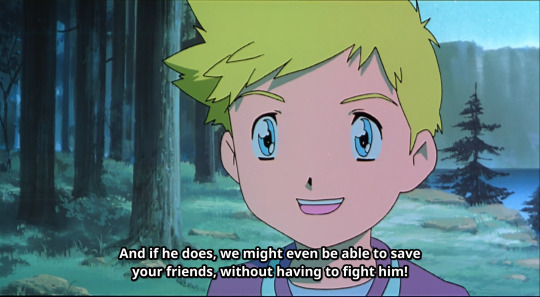
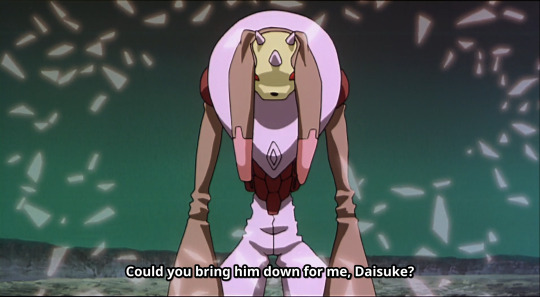

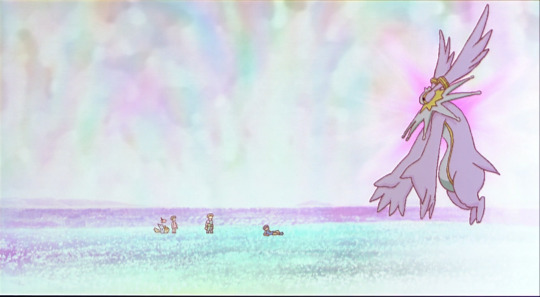
While in the series itself, they’re successfully able to save Agumon anyway, Hurricane Touchdown presents a more unfortunate outcome of the “friendly fire” debate, in which Daisuke learns that the hostile Digimon kidnapping their seniors (and, later, a lot of other people) is Wallace’s own partner. Daisuke is so emotionally overwhelmed by this that he breaks down crying at the possibility of having to kill someone’s partner, knowing that he’d never be able to do something like this if it were V-mon, and Wallace gets him on board with an attempt to appeal to Chocomon without fighting.
This stance is not unreasonable, Wallace and Daisuke cannot be blamed for being hopeful, and, in the end, it’s admirable that they did make a conscientious effort to solve this with pacifism (again, this kind of attempt should be made, and it’s not good to beeline to the most violent solution for no reason). But unfortunately, once they meet Chocomon in the flower field, it turns out that not only is Chocomon beyond reason, he himself is also clearly out of his right mind and suffering through all of this, and Wallace finally relents and asks Daisuke to assist him in the fight (after having stayed in denial for half a movie about wanting to avoid this). Daisuke, witnessing all of this himself, agrees without hesitation, and eventually, it turns out that this decision for the best when Chocomon himself begs Gumimon and Magnamon to put him out of his misery, and them obliging (albeit hesitantly) allows him to have peace in death instead of suffering in life.
Hurricane Touchdown’s sequel drama CD, The Door to Summer, presents Daisuke with yet another dilemma with Nat-chan, who is also clearly suffering in quite a similar vein (the parallel is directly drawn). In the end, the same conclusion is reached -- Nat-chan is unfortunately killed, but is able to find release.
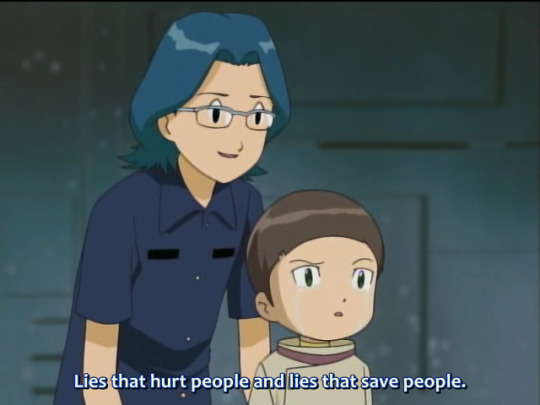
02 episode 16 presents an argument about the limits of ethical principles instead of approaching things practically, when Iori considers himself a horrible person for having told a lie to get Jou out of an important exam. This is mainly just about a lie, but in terms of Iori’s character arc and its relevance to 02′s themes as a whole, the point here is that there is a certain point where being too stuck on “the moral principle” of things instead of thinking practically is actually selfish in some sense. If Iori hadn’t lied, he’d get maybe one more point of moral integrity, and then everyone would have suffocated to death -- compared to lying and therefore everyone for the most part benefiting (Jou’s very happy to help his juniors and save them from, well, literally suffocating, after all). This topic becomes very important later when it turns out to be generally applicable to the wider morality of fighting that the kids later face in the series’s final cour.

The disparity between “moral principles” and “what actually happens in practice” also shows up in 02 episode 19, when Takeru loses his composure and starts punching out the Kaiser. Is the Kaiser a horrible person (at this point) who totally deserves this? Absolutely! Are we as the audience getting a lot of catharsis seeing his face punched out? Probably! But at the same time, railing at the Kaiser with unbridled anger is also...not actually accomplishing anything! Instead, Takeru’s just getting a few moments to stew in some really unhealthy emotions and uselessly punching out the Kaiser while nothing productive is getting done, and it’s also contributing heavily to his emotional isolation from Iori (and the rest of the group) because he’s not coping with it in a healthy way at all. Takeru’s feelings are certainly understandable (again: the episode is absolutely framing this in such a way that you’re inclined to take his side), but at the same time, being malicious about this is not actually practically making any headway.
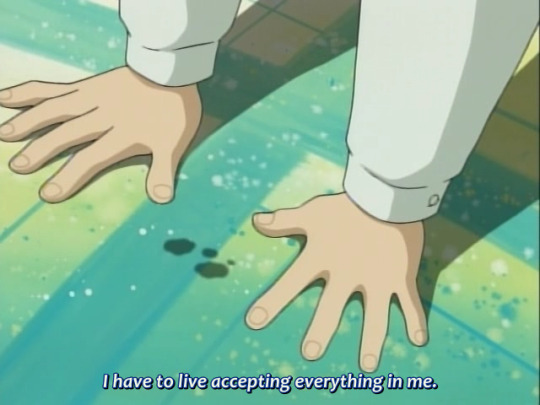
One of the major reasons I’m covering all of these seemingly unrelated topics in one post is that all of them end up having a massive combined amount of relevance to the narrative behind Ken discarding the Kaiser persona, and how he comes to integrate himself with the group. On the surface, the storyline seems to be simply that Ken learned the error of his ways and tried to stop drowning in regrets, and Daisuke’s idealistic personality reached out to him and helped him heal. That said, there’s quite a bit more going on than just that.
A theme going on behind Ken’s character arc for the second half of 02 is one that probably seems a bit unusual for an idealistic kids’ show, but the point that ends up being made quite often is that whether Ken should be “forgiven” for his actions is a rather immaterial question. 02 episode 23 has a bunch of Baby Digimon rail on him, and remind him that he will never be able to take that back. There is nothing in either world that will erase those actions or make them retroactively justified or pushed under the bridge. The only thing he can do is accept the fact that it happened, whether he likes it or not, and determine what to do from here in terms of taking responsibility and making things right.
And this ends up having an influence in how Daisuke advocates for him, and how the rest of the group reaches out to him...
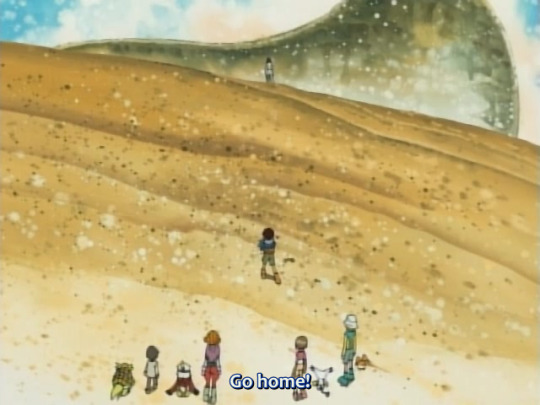
First of all, Daisuke being the most open-minded about Ken was not blind optimism. There’s no evidence that he was actually all that emotionally receptive to Ken or interested in being his friend before 02 episode 25. However, Daisuke also does not advocate for “punishing” Ken or kicking him while he’s down -- because that won’t accomplish anything, and Ken is clearly not in a state to be wreaking more havoc right now. Daisuke remembers the footage of Ken’s parents crying on screen, and determines what would be the first course of action to fix this situation -- and thus, he tells Ken to “go home”, because whatever Ken did in the past and no matter how much the team resents him right now, they are in this situation, with a boy who’s clearly not going to cause any more trouble right now and a family that’s hurting by his absence, and the very least he can do is do something productive from here on out.
Hence, at the end of 02 episode 24, when it turns out that Ken’s back and saved them from Thunderballmon, Daisuke decides to be optimistic about him and start the process of emotionally reaching out, but, again, it’s not blind optimism -- he sees what Ken did and takes this to mean “okay, clearly he’s not going to do bad things anymore, so regardless of whatever he did in the past, he’s helping out now, so we should check in with how he’s doing and let him help out.”
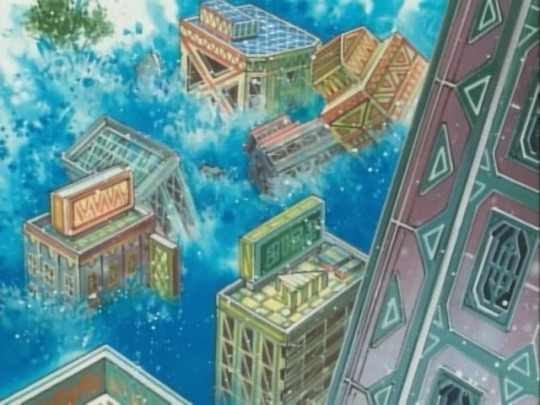

This is, of course, enhanced by the fact that Daisuke had communicated with the Crest of Kindness in 02 episode 20, but there’s also another layer to this: the major point of dispute between him and Miyako in 02 episode 25 (with both of them generally being rather open-minded about Ken otherwise) is in regards to the fact Ken and Stingmon were responsible for killing Thunderballmon in the prior episode. Come the climax of 02 episode 25, it is made clear that if Golemon successfully destroys the dam, the results will be absolutely disastrous, and there will probably be an incredible amount of casualties. Here, Daisuke himself is the first person to realize that killing Golemon may become a requirement (Ken is not actually a part of his initial comment) -- that is to say, most likely, the reason he’s willing to give Ken the benefit of the doubt about Thunderballmon is that he himself is understanding of that potential mindset (especially since 02 episode 43 does indeed establish Daisuke as being the first to accept it).
Recall that, between Daisuke, Miyako, and Iori, Daisuke was personally involved three years prior in a large incident with an unambiguously malicious Digimon that was about to claim a ton of victims -- he’s a bleeding heart, sure, but he’s also a bleeding heart for the potential victims, and the one thing that ate at him during the time of the Vamdemon incident was that he couldn’t do anything to protect everyone. Therefore, he’s the most receptive to this potential conclusion because he doesn’t want to see victims like that again. Not only that, Takeru and Hikari (having witnessed similar conclusions back in Adventure) are also very quick to point out that this might be an inevitability -- it’s just Miyako (who, in her emotional passion, is desperate to find a way out and clinging onto the hope that they won’t have to) and Iori (who considers doing such an act “no better than him” -- again, see the fixation on “moral principle” and “being above him”) who are so vehemently against it.
In the end, it turns out that Golemon is a Dark Tower Digimon (and therefore not sentient), and everyone’s left off the hook for now, but the reason this is still important is that through this, Miyako learns that Ken -- someone whom everyone was side-eyeing for potentially lapsing back into his cold, callous ways after supposedly having given up the Kaiser mantle -- was not out to kill (and, indeed, when the first kill inevitably happens in 02 episode 43, Ken is just as shaken about it as Miyako and Iori). The important part is that Miyako, and later the other kids, accepted Ken not out of some principle of optimism or forgiveness, but because they came to understand his position and feelings. All of the kids accepted Ken on their own terms after understanding his feelings and position better via interacting with him and hearing his own testimony -- they came to understand his mindset, what he’s been through and what he’s planning to do from here on out, and, most importantly, that he needs support really, really badly right now.
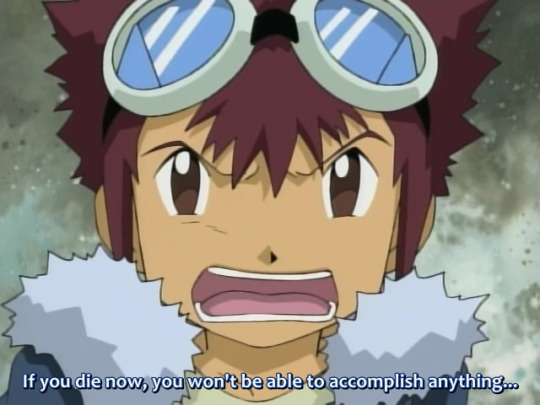

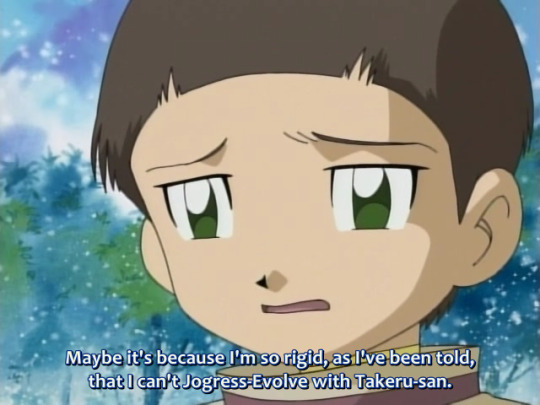
Which extends not just to Ken, but also everyone’s relationships here in general. Daisuke broke through to Ken and kicked off their first Jogress in 02 episode 26 because he proactively listened to everything Ken was saying and what he wanted to do, and correctly identified that Ken very desperately wants to take responsibility, so he talks him out of a reckless suicide mission by pointing out that all of his attempts to not make his family sad and to make up for everything he’s done are going to amount to nothing if he just throws his life away like this. In 02 episode 31, Miyako listens to Hikari’s troubles and her compulsion to not speak out for herself and reaches out to her successfully via promising to be there for her so she doesn’t have to slink into passive resignation. And in 02 episodes 34-36, Iori makes an active effort to understand Takeru’s mentality and why he has the drastic personality shifts he does, and communicates to Takeru that he wants to understand him better. So the point is: the 02 kids were able to successfully connect with each other and become deeper friends because they made an active attempt to listen to each other’s troubles and address the core of what they needed. They were only able to become “supportive” once they understood everything.
(02 episode 36 also has a moment where Iori’s about to rail off at everyone for not taking the fight seriously, before Armadimon reminds him that he’s starving -- again, it is very inhumane to ignore other needs and force everyone to keep fighting endlessly just because they theoretically can.)

We do meet the representative who claims credit for choosing Daisuke, Miyako, and Iori as Chosen Children in 02 episode 37 (Qinglongmon, representative of the Holy Beasts), and he explains the process of why they sent the kids what they did in order to retrieve Ken from the deep end. Notably, Qinglongmon admits that even the Holy Beasts were blindsided by a few things and adapted the situation as they saw fit (they didn’t originally expect the kids to be able to use multiple Digimentals at first). More importantly, this was, again, all a bit of a desperation move, because this was about as much as the Holy Beasts could manage, being sealed and drained of power and all.
Also, while retrieving Ken from the deep end was on the list of things the Holy Beasts set out to do, “everyone becoming Ken’s friend” was not necessarily on that agenda. Again: that was something that these kids chose to do on their own, by observing Ken’s actions and feelings and choosing to connect with him.
The episode ends with BlackWarGreymon going off on a journey of angst, and: note that the kids decide to drop the issue for the time being. Again, they’re operating not on a philosophy of grudge or whether one should get retribution for their actions, but what the likelihood of bad things continuing to happen is from here on out, and at this point in time, it doesn’t seem very likely, so there’s no point in pushing the issue or pursuing him.


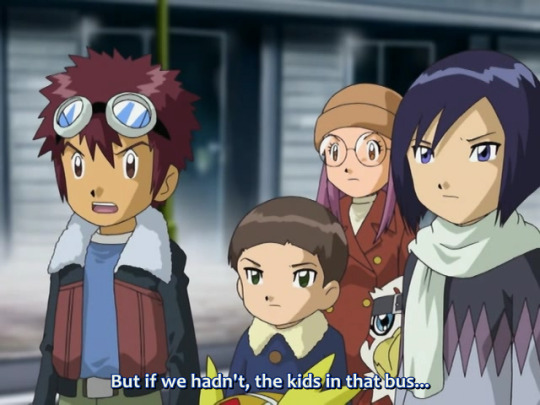
Nevertheless, the morality debate over killing still remains looming over everyone’s heads, with Iori also realizing in 02 episode 29 that there are such things as Digimon that just want wanton destruction and cannot be negotiated with. The fact that the Adventure kids were put in world-threatening situations three years prior and are already far past this question is directly acknowledged in 02 episode 43, with Taichi advising Hikari that this harsh truth is going to hit the other four sooner or later, before it does eventually happen at the end of the episode. (Hikari visibly winces during her conversation with Taichi; again, none of the Adventure kids ever liked this.) And, in the end, predictably, Iori, Miyako, and Ken take it hard -- but Daisuke is the first to point out what would have happened if they didn’t do it. Namely, that the victims would have far outnumbered the Digimon they just killed.
It is, of course, good to be conscientious and not beeline for the most violent solution, and, again, context is important here -- in the situation provided, SkullSatamon was holding up a bus and split seconds away from murdering everyone in it. Had everyone refrained for the sake of morality, just like how Iori refraining from lying back in 02 episode 16 would have actually been selfish in a sense, here, the only claim you get to say after refraining is “well, I wasn’t the one who caused the harm.” Inaction would have caused the deaths of all of the young children in the bus; there would have been casualties either way.
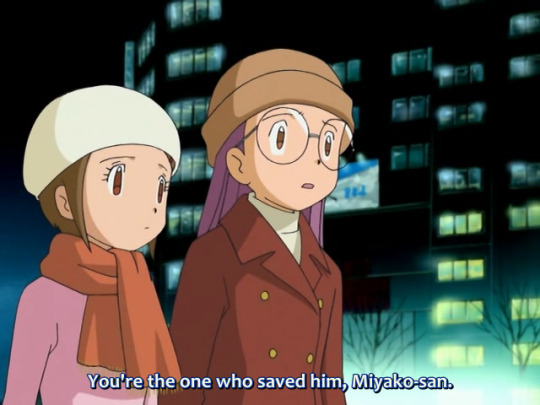

Miyako and Iori are forced to face this truth again in 02 episode 44, with both of them being emotionally compromised by the reality of what they just did. In both cases, Hikari and Takeru step in to remind them what they’re doing this for, by pointing out the victims that would have been killed had they done nothing. Miyako and Iori are not at fault for being emotionally compromised or doing their best to prevent it -- it’s just that there’s only so much they can blame themselves for when they’re now directly faced with the potential victims in front of them.
Iori had already been grappling with this potential for several episodes now, so while he still takes it hard, more attention is given to Miyako’s reaction -- especially since she herself was the victim who was about to be murdered by LadyDevimon had Silphymon not done the kill. The voice acting and lack of Tailmon’s presence in Silphymon’s apology to Miyako implies very heavily that it was the Aquilamon side who took over and did it in a last-ditch effort to save Miyako’s life -- and he’s emotionally destroyed by it himself too, because he did it out of love for Miyako, and yet betrayed her request to not go for the kill. In the end, Miyako is forced to confront the fact that this was done out of love and a desire to protect, not a callous and malicious intent to murder, and comes to terms with it.
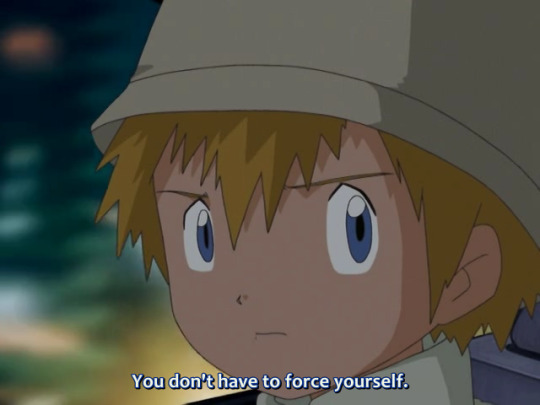
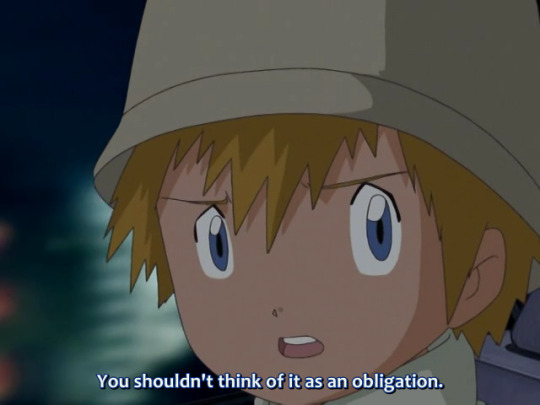

However, again: the series continues to reiterate that people who are not emotionally up for it should not be obligated to force themselves to do it. The beginning of 02 episode 45 has Takeru directly advise Iori that he shouldn’t do this out of obligation if he isn’t up for it -- remember that Takeru will only be able to fight with Shakkoumon if Iori is present, meaning that he’s perfectly willing to give up his ability to fight effectively because it’s not fair to force Iori to do it. This is not a series that advertises that everyone embrace the spirit of killing things and numb themselves to it. This entire situation sucks.
However, Iori makes it clear: he understands everything, and has decided to do it himself, because he understands the stakes and what it’s going to take to actually protect people.
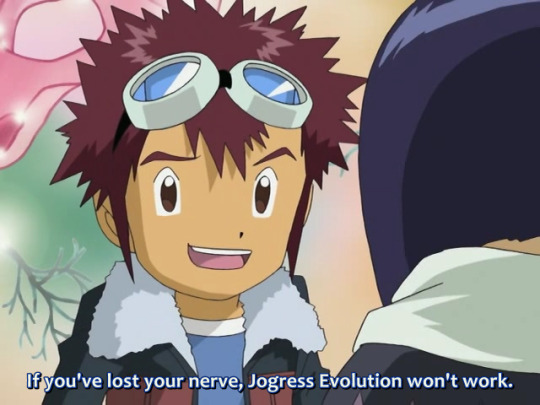
Which is also reiterated in 02 episode 48 -- after witnessing the deaths of Archnemon and Mummymon at the hands of BelialVamdemon, everyone is shaken to the core. It should be established that the kids didn’t have much reason to sympathize with or like the two of them at this point, because everything we learned about them was from the audience’s point of view -- as far as the kids knew them, they were just two really rude and cruel Digimon who wanted wanton destruction. Yet even they are emotionally pained to see them die in such a cruel manner, and it causes everyone to hesitate -- even Daisuke, who does push forward because he knows what’s at stake, but still has to take a moment to collect himself.
Seeing what Daisuke’s about to do, Ken tries to force himself to join Daisuke so that Daisuke will at least not be alone (note that he actually says upfront that he’ll join!) -- but Daisuke notices that Ken’s heart isn’t in it, and actively advises him to sit out. Is the world in immediate crisis? Absolutely! But there is no scorn to be had for people who are emotionally falling apart right now and unable to get themselves to do it -- Daisuke even says himself that they won’t be able to fight effectively with Ken like this.
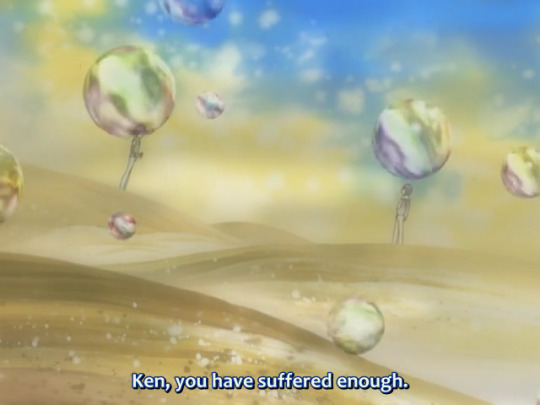

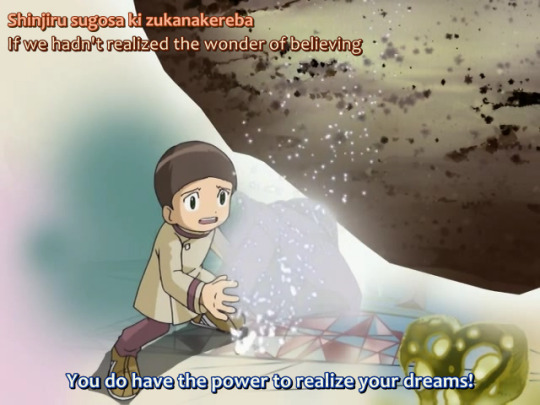
We close this analysis on a return to the concept of forgiveness and moving forward, and we learn in 02 episode 48 that Ken has two parts to his internal wishes: he wants the Kaiser (himself) to be “punished”, and he wants “forgiveness” from his deceased brother Osamu. Both of those things will certainly make him feel a little better emotionally, but they also won’t accomplish anything -- the “Kaiser” doesn’t exist anymore, so what good will that “punishment” do besides a little catharsis for the victims? And he can continue chasing after this standard of “whether he’s suffered enough” like it’s some numerical tally, but that’s not going to get him anywhere either, and it’s why Wormmon has to chase out even that ostensibly happy image of Osamu. Osamu is long gone, and is not going to return, and the question of whether Ken should be “forgiven” is rather immaterial. It’s not about whatever happened or didn’t happen back then; it’s about what Ken is going to do now.
Actually, what is “forgiveness” anyway? At no point do the 02 kids ever actually say they “forgive” Ken for his actions. In Spring 2003, Iori also says he doesn’t forgive Oikawa for what he’s done, either. There’s nothing that will ever erase what they did or suddenly make those actions retroactively justifiable, and there’s no arbitrary payment that Ken or Oikawa could do to meet some kind of quota of forgiveness. But what the kids do recognize in Ken is that, regardless of whatever he did in the past, at current he is a young boy in intense emotional distress who has gone through a lot, is working very hard to make up for his mistakes, and needs all the emotional support he can get, and there’s no reason to hold a grudge against someone like that instead of continuing to support him and loving him for who he is now. Given that, does it matter whether they “forgive” him or not?
And even if Iori will never forgive Oikawa, he can still lament everything that happened to him and drove him to do everything, and appreciate the meaning of what he did for the Digital World in the end, and use this as a further lesson on what it means to understand people instead of stewing angrily in a grudge that’ll only hurt himself.
Ultimately, that is the theory behind Adventure and 02. The world is messy, imperfect, and doesn’t fit under neat rules of morality and “right” or “not right” that you can cram everything under. Despite that, there’s something to be appreciated in not throwing in the towel and continuing to do the best you reasonably can in every situation. It would be ideal if all of the fighting could stop, or if it were possible to make the “optimal” decision of fighting or not fighting in every situation regardless of human exhaustion or emotional compromise, but that’s just not something that’s possible, and there’s no reason to call oneself a “failure” for not holding yourself to that standard. And in the end, the answer is this: instead of fixating on all of those arbitrary things that don’t actually serve any practical purpose, the way to live your best life is simply to look at where you are now, think about what you can do from here on out (regardless of what happened in the past), and do your best to protect and be kind to yourself and those around you.
Of course, you must be kind to others. But you have to be kind to others by understanding what it takes and everything around it -- and then choose to be kind anyway.
121 notes
·
View notes
Note
Rant time!
You know, I've been thinking it for a while, but fanon c!Dream is straight up boring.
And you know that c!Dream is one of my favourite characters usually, but... man. The idea that he needs to be sympathetic or justified in what he did to be enjoyed just sucks out all the fun for me!
It like trying to give sympathetic reasons to Bill Cipher from Gravity Falls. Why would you do it? They are both chaotic assholes who hurt others for fun, why is it this hard to enjoy them as such?
Like... man...
I sometimes see takes that are like: "but c!Dream did everything for a good goal, he was trying to bring the server together" and I'm just sitting here wondering if we even watched the same streams.
Like, yeah, he WAS planning to bring everyone together, after kidnapping c!Tommy and killing c!Tubbo, but he wasn't planning to do so in any way that's considerable "good". He was literally planning to blackmail everyone into obedience. How is that a good or noble goal? Since when wanting absolute control over people was a good thing?
And some of this people are the same who'll call c!Wilbur or c!Tubbo a "dictator" and they really don't see the irony there.
And the big issue I have with this is when people try to use this reasoning to justify exile, because it doesn't even make any sense. How did abusing a teen further the goal of bringing a server together? Seriously, how did kidnapping and abusing c!Tommy to the point of him becoming actively suicidal help anything? It only motivated c!Tommy in wanting to bring him down more, which, good for c!Tommy, he deserved to murder a bitch, but still! How does that help for unity?
Oh absolutely.
Though, while I don't really like fanon Dream either and find him boring, the concept is... Interesting? Well, it's definitely interesting it's just not as new and unexplored as what we actually get with many characters in canon.
Someone, who apparently holds a position of authority and power by nature, with no inherent malicious goals or anything, just the normal amount of imperfect morality; being challenged on the grounds of the duality between his inherent power and his inherent flaws, becoming defensive and over time becoming more and more removed from his own humanity and morals? Maybe his morals didn't even change, maybe he was always willing to do the things he ended up doing and what changed is his judgement on when these actions are warranted?
And if you've managed to follow my thoughts you might have noticed how fanon Dream easily turned into what a lot of us consider canon Dream. Because in my opinion, those two aren't that different. Fanon Dream might (mostly) be how canon Dream saw the entire conflict at some point in time. I don't like throwing around medical terms because I don't like perpetuating any wrong stereotyped and all that jazz, but I can't start studying psychology so I'll kinda have to, so please excuse me when I say this but. Dream is delusional.
Nowadays he's separated himself from his own humanity to such an extreme that, yeah, he's not gonna see himself as the victim, but also. Such things change and we legitimately don't know how he was thinking before. Well... Exile? I guess? We don't know how much of his godcomplex is this showmanship against himself similar to how Wilbur often fooled himself into thinking that he was thinking a certain way. We don't know how much of the way he acts is performance especially if the audience might be himself.
I like to think that most fanon works are legitimately just his delusional daydreams in a time when he was still maybe grappling with the knowledge of his actions. Because I like to imagine that there was an internal conflict that he resolved with his godcomplex.
That when he took a breather and re-evaluated his own actions, he found a way to justify it in his head to keep him going for a bit more and the longer he went down the road, the less he could justify his actions and the more he had to justify that with just. Distancing himself from... Well... Humanity, morality... All of that.
I hope I'm making sense here? Fanon Dream is such a microcosm of the complexity that canon Dream likely is and yeah that's usually disappointing but also. Sometimes we have 10 minutes of absolute simplicity.
Usually I know that I'm a complex human person, in a world that wasn't created In a specific way to fit the shapes humanity moves in, that date both exists and also doesn't and that life just is. And sometimes I just lie down, know that I'm an utter failure and that's it. And then after those 10 minutes are over I once again have the energy to know that I wasn't born with a purpose given to me because there is nothing with the authority and power to give me a purpose and that that is both absolute meaninglessness and absolute freedom.
So yeah, dream apologism fanfics are dreams way of coping with depression or whatever that is when his brain doesn't have the energy for keeping up his godcomplex. Mayhaps.
Holy shit i gotta Sound pretentious as fuck
40 notes
·
View notes